Champion Credit Union expands with merger Page

WNC town considers Safe Haven Boxes Page 16



WNC town considers Safe Haven Boxes Page 16



On the Cover:



Waynesville native Fred Moody went missing after an F-4 Phantom jet he was in went down over the jungles of Vietnam, leading to a lifetime of grief for his loved ones. Now, after over five decades, an American hero is finally coming home. (Page 6) Donated photo
News
Champion Credit Union and Ecusta Credit Union Announce Merger................4 Cherokee Police Commission discusses cannabis..................................................5
Swain school board will revise policy to comply with new law..........................13

Referendum votes meet turnout threshold................................................................14
Data shows improvements for local charter schools..............................................15 Sylva considers Safe Haven Boxes..............................................................................16 Education briefs..................................................................................................................19
The Allure of Gambling Money......................................................................................20

A tribute to Dr. Arnold, a true teacher..........................................................................21
A&E
Dalton Mills to play Yonder Community Market........................................................22 Franklin welcomes bluegrass legend..........................................................................24
Outdoors

Waynesville couple inducted into Livestock Hall of Fame....................................30 Mountain mint, a great pick for a pollinator garden................................................34
D IGITAL MARKETING S PECIALIST Stefanee Sherman.
ADVERTISING SALES: Susanna Shetley.
Amanda Bradley.
Sophia Burleigh.
C LASSIFIEDS: Scott Collier.
N EWS E DITOR: Kyle Perrotti.
WRITING: Holly Kays.
Hannah McLeod.
Cory Vaillancourt.
Garret K. Woodward.
ACCOUNTING & O FFICE MANAGER: Jamie Cogdill. . .

D ISTRIBUTION: Scott Collier. .
jack.s@smokymountainnews.com

stefanee@mtnsouthmedia.com
susanna.b@smokymountainnews.com

jc-ads@smokymountainnews.com

sophia.b@smokymountainnews.com
classads@smokymountainnews.com
kyle.p@smokymountainnews.com
hannah@smokymountainnews.com
garret@smokymountainnews.com
smnbooks@smokymountainnews.com
classads@smokymountainnews.com
C ONTRIBUTING: Jeff Minick (writing), Chris Cox (writing), Don Hendershot (writing), Thomas Crowe (writing)

WAYNESVILLE | 144 Montgomery, Waynesville, NC 28786
P: 828.452.4251 | F: 828.452.3585
SYLVA | 629 West Main Street, Sylva, NC 28779
P: 828.631.4829 | F: 828.631.0789


















I NFO & B ILLING | P.O. Box 629, Waynesville, NC 28786
SUBSCRIPTION: 1 YEAR $80 | 6 MONTHS $55 | 3 MONTHS $35



 written by Ingles Dietitian Leah McGrath
written by Ingles Dietitian Leah McGrath


Essential oils are often talked about as a natural product and remedy when it comes to aromatherapy, i.e. certain scents may be pleasant and calming an ingredient in lotions, soaps and perfumes. Some essential oils can be products can be hazardous if used inappropriately or in large amounts.
• Rashes on skin – Some essential oils, when applied directly to the

• Breathing difficulties
(Special note about your pets. Cats and dogs have much keener ability to smell than humans and



• Poisonous if consumed – Many oils are not meant for consumption and Eucalyptus can cause seizures. Nutmeg oil when used in high amounts can cause hallucinations and coma.
• Endocrine (hormone) disruptors
Bottom Line: Using natural products medicinally can be problematic


Sources: Poison Control – poison.org
Leah McGrath, RDN, LDN Market Corporate Dietitian

 Leah McGrath - Dietitian
Leah McGrath - Dietitian
We Can Cater Everything from an Intimate Get-Together to a Large, Formal Gathering & Everything In-Between!

Catering is Our Passion! 828-452-7837
294 N. Haywood Street
Waynesville

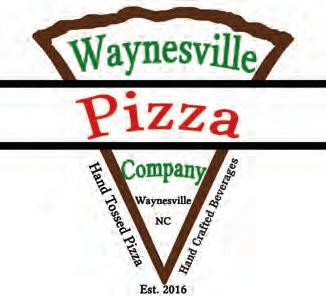
• Sunday - Wednesday 11am - 5pm Bar open until 6pm
• Thursday - Saturday 11am - 8pm Dinner Menu begins at 5:00 pm

perfect for all walks of life, from families to golf groups to ladies who lunch.We pride ourselves on using fresh ingredients from our gardens and supporting local farmers. The details are priority.
Champion Credit Union announced that Ecusta Credit Union, which has served Transylvania and Henderson counties since 1976, will formally merge into Champion Credit Union later this year, in a move a press release noted is aimed at enhancing financial services and member experience.

“This strategic move solidifies Champion Credit Union’s commitment to providing exceptional financial services and expanding its reach to better serve its members,” the release reads.
The decision to merge was reached after thorough consideration of the benefits it would bring to both credit unions and their valued members.
“Champion’s history as a ‘paper mill’ credit union closely aligns with Ecusta Credit Union’s own story,” the release reads. “Champion has been fortunate to grow substantially over the years. Their members’ experience is highly regarded, their financial stability is very solid, and they have a reputation of being an incredible employer, recently being recognized as a top thirty credit union to work for national-
ly by American Banker.”
The strategic move is set to leverage the strengths of Champion Credit Union to create what the release called “a more robust experience for members and long-term stability and growth, allowing Ecusta members to take advantage of competitive products and services that are necessary to meet their needs and allow them access to six additional branch locations across Western North Carolina.”
Additional benefits of the merger include:
• Financial Strength: The merger reinforces Champion Credit Union’s financial stability and strength, ensuring that members can continue to rely on secure and trustworthy financial services.
• Community Commitment: Champion Credit Union is dedicated to impacting and supporting local communities through financial education, charitable giving and community involvement. Ecusta Credit Union is also very active in the community so, once united, the credit union can extend its commitment to even more areas.
“This merger reinforces our dedication and our commitment to our members, the community, and to our employees, both old and new, that we are here to make their lives better today than they were yesterday; that we are here to help them experience more.”
Ecusta Board Chair Martha McCrary shared her thoughts as well.
“We believe that this merger is a winwin for our members and employees,” she said. “Champion Credit Union shares our dedication to member service, community involvement and the well-being of our employees, making them an ideal partner for our credit union.”
The release states that both credit unions are dedicated to maintaining the highest standards of service and member satisfaction throughout the merger and beyond.
Eight people charged in Haywood County with trafficking and possessing illegal drugs are now serving active time in state prison, District Attorney Ashley Hornsby Welch said.

The defendants all pleaded guilty late last month in Haywood County Superior Court, with Judge Gary Gavenus presiding. Here’s what happened:
• Robin Morris Baldwin Jr., 41, of Swannanoa, was arrested Dec. 1, 2022, at Exit 105 west on I-40 near Clyde. The car’s dark, tinted windows caught the attention
• Enhanced Member Services: Members of both Champion Credit Union and Ecusta Credit Union will benefit from a wider range of financial products and services, including competitive loan rates, expanded branch and ATM access, and digital banking solutions.
Jake Robinson, president and CEO of Champion Credit Union, expressed his enthusiasm regarding Ecusta’s merger into Champion Credit Union.
“We are excited to welcome the members and employees of Ecusta to our Champion Credit Union family,” he said.
“The merger of Ecusta Credit Union into Champion Credit Union will be carried out diligently and efficiently to minimize any disruption to members,” the release reads. “The leadership teams will ensure that members are informed of all developments and changes throughout the transition. Existing Ecusta Credit Union members will receive detailed communication outlining the transition process in the coming months.”
of Haywood County Deputy William Brigham. Baldwin consented to a search of the vehicle, and deputies found a broken methamphetamine pipe and methamphetamine. Baldwin pleaded guilty to possess methamphetamine and habitual felon. He received 30-48 months in prison.
Assistant District Attorney Kate Robinette prosecuted the case.
• Michael Shawn Brown, 32, of Asheville, was arrested Jan. 31, 2023, at Exit 33 on I-40 after Deputy Hayden Green pulled a vehicle over for traffic violations. Deputies discovered fentanyl during the subsequent search. Brown pleaded guilty to trafficking opiates. He received 70-93 months in prison and must pay a mandatory $50,000 fine. Assistant District Attorney Jeff Jones prosecuted the case.
• Charles “Chuck” Winfred Bryson Jr., 55, of Waynesville was arrested three times within four months on charges connected with illegal drugs. On July 9, 2023, on New Clyde Highway, Deputy Green stopped a vehicle in Clyde for speeding. Methamphetamine was discovered in Bryson’s pocket. On Oct. 13, 2022, Deputy Brigham observed Bryson leaving a suspected drug house on Georgia Avenue; Detective Sgt. Jordan Reagan then stopped the vehicle for ignoring a stop sign. A subsequent search uncovered methamphetamine. On Oct. 20, following another traffic stop involving Bryson, this time on Asheville Highway, deputies found methamphetamine in the car. Bryson pleaded guilty to three counts of possess methamphetamine and three counts of habitual felon. He received two consecutive sentences for 30-48 months, with a total active sentence of 60-96 months in prison. Assistant District Attorney Jones prosecuted the case.
• Cassarah Ensley, 29, of Sylva, was arrested March 2 of this year in Canton, following a previous arrest on Dec. 29, 2022, also in Canton, with Deputy Green receiving backup from Deputy Joshua Watts. Ensley pleaded guilty to possession of fentanyl and trafficking in methamphetamine. She received 70-93 months in prison and must pay a mandatory $50,000 fine.
Assistant District Attorney Jones prosecuted the case.
• Hunter Goodson, 26, of Waynesville, was arrested on illegal drug charges at his home subsequent to a search warrant. He pleaded guilty to possession of fentanyl and, in a separate case, trafficking in opiates (fentanyl). Goodson received 70- 93
month in prison and must pay a $50,000 fine. Assistant District Attorney Jones prosecuted the case. The lead detective was Waynesville Police Officer Cody Corn.
• Teresa Spencer, 61, of Candler, was arrested Nov. 12, 2022, at a Maggie Valley motel after illegal drugs were discovered in a joint operation involving Maggie Valley Police Department and Haywood County Sheriff’s Office. Law enforcement officers who were involved included Maggie Valley Police Chief Matt Boger and David Stoller, Sgt. Reagan and Craig Campbell of Haywood County Sheriff’s Office. She pleaded guilty to trafficking in methamphetamine and to trafficking in opiates (fentanyl). Spencer received two sentences for 70-93 months, running concurrently, and must pay mandatory fines totaling $100,000. Assistant District Attorney Jones prosecuted the case.
• Baron Houston Sutton, 37, of Maggie Valley was arrested June 8, 2023, following surveillance of a residence. A search of the residence uncovered illegal drugs. He pleaded guilty to trafficking opiates (fentanyl). Sutton received 70 to 93 months in prison and must pay a mandatory $50,000 fine. Assistant District Attorney Robinette prosecuted the case. Deputy Brigham and Sgt. Reagan were the lead officers.
• John Williamson, 32, of Franklin, was arrested Feb. 26, 2023, following a traffic stop on Jones Cove Road by Deputy Alexander Ladin. A trained drug dog alerted deputies to the presence of illegal drugs. Williamson pleaded guilty to trafficking methamphetamine. He received 70-93 months in prison and must pay a $50,000 fine. Assistant District Attorney Jones prosecuted the case.



Aweek after Cherokee voters overwhelmingly voiced their support for legalizing cannabis on the Qualla Boundary, the Cherokee Police Commission spent 20 minutes of its monthly meeting discussing the potential impacts of such a change.
Commission Chairman Gene “Tunney” Crowe Jr. worried that legalized cannabis could spur members of Western North Carolina’s growing homeless population to travel toward the Qualla Boundary.
“I think that it’s going to increase the crime … because we’re going to see an influx of people coming in here,” Crowe said. “So that’s something that I think we should be trying to address now.”
Commissioner Kym Parker, who is also a business owner in town, said she’s witnessed some concerning changes over the years, including an increase in homelessness. She agreed that Commission members should be thinking about how the referendum results, if implemented, might intersect with these existing issues.

“I can’t blame one thing,” she said. “I can’t blame the casino, I can’t blame marijuana, I can’t blame alcohol on it, because it’s just society, it’s the world today. What we are doing though, is we’re making ourselves a bigger spot on the map so people are seeing us and hearing us and seeing all we have here.”
Every big change, from casinos to cannabis, has ripple effects on the local community, she said.
“I agree with you, there will be more homelessness, there will be more crime,” Parker said to Crowe. “Like you said, we need to get the horse before the cart.”
It seems that few tribal members share those views. During the Sept. 7 election, 70% of voters cast their ballot in favor of allowing adults 21 and older to legally smoke cannabis on the Qualla Boundary. According to unofficial results, 52.4% of registered voters participated, far exceeding the 30% turnout threshold required for the referendum to be valid.

But the vote did not legalize marijuana overnight.
“Since election day, a common question has been whether or not the referendum automatically legalized adult-use marijuana,” reads a Sept. 15 press release from the EBCI Office of the Attorney General. “It did not. The effect of the referendum is that it shows support for legalization among a majority of voters. Tribal Council is the Tribe’s lawmaking body. Any change to Tribal law will have to be made by Tribal Council.”
Such changes — as well as development of new laws and regulations surrounding legalization — will be a task for the newly elected Tribal Council set to be sworn in Oct. 2. However, members of the Police Commission may wish to offer input to that discussion.

“I think we need to get a statement together in conjunction with the [Police Department], just to get some good points and stuff, bring them to light of what could happen, what might happen, what will happen,” Crowe said. “Just so that everybody is aware of it.”
Any new regulations should be as easy to enforce as possible, added Commissioner Anita Lossiah. For example, as with alcohol, having an open container in the passenger area of the car should be illegal.
Crowe expressed concern about people smoking cannabis in public places such as Oconaluftee Islands Park, where parents often take children to play and splash in the water.
“Let’s get this discussion out there beforehand,” he said.
The tribe decriminalized possession of small amounts of marijuana — 1 ounce or less — back in 2021, and that will likely continue to be the limit, said Cody White, associate counsel for the EBCI Attorney General’s Office assigned to the Cherokee Indian Police Department. That limitation applies regardless of enrollment status.
“If you have over the amount, over an ounce, and you’re nonenrolled or enrolled, you’re going to get prosecuted,” he said.


Parker expressed trepidation about legalizing recreational marijuana when, on paper, it’s still illegal under federal law.
“Are we not ruled by federal laws?” she asked.
“On paper, yes, absolutely federal law still applies,” White said. “But there have been conversations with the [Department of Justice], and it’s basically play by the rules. Don’t send it off, and don’t bring it in.”



Playing by those rules is another challenge for the tribe to work out. The tribally owned Qualla Enterprises LLC is currently operating a cannabis farm on the Coopers Creek property, which is on tribal trust land. But driving from the farm to the main Qualla Boundary requires traveling a short distance through Swain County land — complicating the logistics of distribution.
The tribe is still working through that problem, White said.
“My obligation to the Police Department is to ensure that with this transition, that no laws of the State of North Carolina or the tribe are infringed upon or broken in doing this,” he said.
Throughout his life, Frederick Mervyn Hall was enveloped in the kind of love that for his wife, his parents, his classmates and his hometown didn’t end on a mountainside in Vietnam all those years ago.
Fred was a good kid from a cozy community who went to war for freedom and democracy but didn’t return. He never got the chance to create a life for himself, to have a career, to start a family, to grow old with them. He was only 25.
Like thousands of his generation, he was more than just a name carved on some monument somewhere. He was a loving husband, a devoted son, a dear friend, a talented musician, a cultured scholar, a dependable military officer — a hero.

After being listed as missing in action for more than 54 years, Fred now comes home to tributes not bestowed on all of his Vietnam-era comrades; it was a complex conflict between world powers fighting over abstract notions, and many Americans who inherited its legacy still struggle with it.
Next month, Western North Carolina will get to show Fred, and the world, what it truly means when a hero comes home.
Fred was born on June 6, 1943, the only child of Robert “Birdie” Hall, a Champion Paper employee who had emigrated from Dublin, Ireland, and Irene “Reeney” Galloway, a Waynesville native who worked as a nurse at the old Haywood hospital beginning in the 1930s. Fred was the apple of their eye.
They lived in a happy little two-bedroom house up on Keller Street in Waynesville. During the chilly Western North Carolina winters, warm air from the basement furnace blew up through vents in the floor, where young Fred would huddle while getting dressed for school.

His mother, a real “Betty Crocker” type, was always in the kitchen preparing multiple formal meals and desserts and pots of tea each day, and also making young Fred his favorite breakfast, buttered toast with crispy melted brown sugar on top.
Waynesville was a sleepy mountain town then, with less than half the population it has today; the newly-created Great Smoky Mountains National Park was still in its infancy, and tourism hadn’t yet astroturfed the rural Appalachian character of the place, leaving it much as it had been for the previous half-century — densely wooded misty mountain peaks looming low over a tidy downtown surrounded by cool mountain streams and rolling pastures rich with cattle. Grandma Minnie Jenkins Galloway and grandpa George Galloway lived just up the hill from the Halls. George smoked hams from the hogs he’d raised and slaughtered and would grow corn, gourds and a little tobacco.
Fred would often sit in F
their garden, pulling spring onions right out of the ground and eating them.
A handsome, blue-eyed, blond-haired boy, Fred was a budding instrumentalist who took his love of music with him to Waynesville Township High School in the late 1950s.
“He was a great kid,” said Chip Killian, a prominent Haywood County attorney and one of Fred’s best friends from childhood. “Just a straight up nice kid, straight-arrow type of kid. Good student. Played flute in the band.”
In 1957, Fred earned a certificate of achievement from the school because, as a member of the junior band, he maintained an “A” average and was voted outstanding in his section. He sang as a tenor in the school’s chorus, made all-state band and was involved with several other school clubs.
Fred and his friends were clean-cut, allAmerican boys. About as wild as they got was staying up until the wee hours of the night playing bridge, Fred’s doting mother plying them with tea and sandwiches.
Offered a full-ride to the University of North Carolina in Chapel Hill for music, Fred turned it down, deciding he wanted to study business there instead.
In his senior yearbook photo, Fred — clad in a white shirt, white tuxedo jacket and black bow tie — offers a mischievous smile while gazing intently at some far-off horizon. Below his photo is a quote.
“More people than ever before are graduated,” he wrote, “but not educated.”

By the mid-1950s, when Fred was in high school, the Southeast Asian region of Indochina now known as the Socialist Republic of Vietnam had been a French colony for more than 60 years but for a brief Japanese interregnum near the close of World War II.
The French regained control quickly after Japan’s defeat and soon faced a communist insurgency led by Ho Chi Minh, a nationalist revolutionary. With assistance from two other communist regimes, China and the Soviet Union, Minh proclaimed the Democratic Republic of Vietnam, seated at Hanoi in the north. The United States and Great Britain instead recognized the Frenchbacked State of Vietnam, centered at Saigon in the south.
Advisors from the United States became involved in 1950. France ended its military
involvement in May 1954 after its garrison at Dien Bien Phu was overrun by communist insurgents.
When the peace agreement was signed two months later, Vietnam had been partitioned over the protestations of the South Vietnamese delegation and against the wishes of Minh, who wanted to continue the fight.
The fight would unofficially continue through the late 1950s as the North and the South, with the support of their allies, each carried out activities aimed at destabilizing the other.
President John F. Kennedy, meanwhile, began his first term focusing on communist expansion that had taken place during the earliest days of the Cold War, but it wasn’t going very well.
In April 1961, Kennedy’s invasion of Cuba by U.S.-sponsored exiles at the Bay of Pigs failed. Less than four months later, construction began on the Berlin Wall.
“Once the United States put its support behind the South Vietnam regime after the French-Indochina War, I think it became an issue of credibility that if a United States ally had fallen to communism, that was going to have an impact on U.S. credibility and prestige that would undermine larger Cold War contests,” said Greg Daddis, director of the Center for War and Society at San Diego State University and the U.S.S. Midway Chair in modern U.S. military history there.
Daddis holds a bachelor’s degree from the United States Military Academy at West Point, a master’s degree from Villanova University and a Ph.D. from the University of North Carolina at Chapel Hill. He retired as a colonel from the Army after 26 years of service, wrote several books about the Vietnam War and served as an advisor on Ken Burns’ 2017 documentary.
of it had to do with this fear of expanding communism.”
Kennedy told The New York Times that he wanted to “draw a line in the sand” against communist expansion and that Vietnam was the place to do it. The year before Kennedy began his term, U.S. military presence in Vietnam was rather modest with just 900 advisors. But in 1961, when Fred left Waynesville for college in Chapel Hill, that number grew to more than 3,200.
The next year, as Fred began the first of his two summers working as a lifeguard at the old Waynesville Recreation Center, Kennedy more than tripled the number of troops to 11,000.

Fred headed back to Chapel Hill in 1963, two months before Kennedy was assassinated. Troop totals in Vietnam approached 20,000.
Before returning to Chapel Hill in 1964, Fred spent a week visiting the World’s Fair in New York City. The motto of the fair, for which Kennedy had broken ground in 1962, was “peace through understanding.”
As Fred sampled New York’s big-city life and the cultural offerings of World’s Fair exhibitors from Greece to Pakistan, U.S. involvement in Vietnam was escalating.
In 1965, Fred spent the summer getting some work experience as a night auditor in Kittery Point, Maine, at a 200-year-old resort called Sparhawk Hall. That year, when 3,500 Marines landed at Da Nang, the U.S. ground war in Vietnam began in earnest. Troop levels exploded to more than 180,000.
Da Nang marked a significant departure from Kennedy’s supposition that South Vietnam could mostly take care of itself and signaled the beginning of hands-on American involvement in the conflict.
When Fred finally graduated from UNC with a bachelor’s degree in business administration in 1966 there were 385,000 American troops in Southeast Asia.
By 1967 there were more than 485,000 troops on the ground.
Fred decided he wanted to be among them.
In February 1967 he enlisted in the Air Force.
A July 5, 1967, brief in the Waynesville Mountaineer, Haywood County’s oldest newspaper, says Hall was commissioned a second lieutenant at Lackland Air Force Base in San Antonio, Texas, on June 30 after completing basic training at nearby Randolph Air Force Base.
Soon, he would report to navigator school at Mather Air Force Base in Sacramento, California.
His mother said in a subsequent interview that even though Fred could have avoided serving due to his status as an only son, he felt that doing so would dishonor his country and his friends.
“There was concern that it could create this ‘domino effect’ that would undermine the U.S. position in Southeast Asia, and then close off that entire part of the world for the United States, which would limit their access to raw materials and trade markets,” Daddis said. “I think there certainly was an economic component, but I really do think that a lot
“I think most Americans, even those who were drafted or volunteered, felt that they were following in their fathers’ footsteps, the World War II generation that had fought for democracy and freedom abroad,” Daddis said.
As the war dragged on, those assumptions began to draw more and more scrutiny. Is U.S. national security really at risk? In South Vietnam, of all places? Is this a nation-state committed to democracy? If it’s not, why are we fighting on their behalf?
“Most folks will tell you that 1968 is this tipping point where public opinion starts to shift gradually away from trusting the government and believing in these kinds of Cold War assumptions,” Daddis said.
Right around that time, Hall was stationed in Arizona at Davis-Monthan Air Force Base, living in a nearby apartment complex called the Spartan Arms on North Alvernon Way in Tucson.
It was there he met a University of Arizona art student named Julia Jean Keith, a Texan crowned Miss Houston in 1965.
The apartment complex had a pool, where nearly all the residents formed a close bond. They would all gather there in the evenings, grilling, swimming or just socializing. Fred would bring his guitar down and play folk songs popular at the time, or hymns, as others sang along. They all went on complex-sponsored outings, like to the dog track. Sometimes, they attended church
together.
Fred and Julia immediately became best friends. She couldn’t even remember their “first date” because they’d been so close since their first meeting that the transition from friends to soulmates was less of an event than it was a natural evolution.
“He latched onto me, and he was crazy about me,” she said. “And I was crazy about him.”
They were married in Tucson on Dec. 18, 1968, while Hall was still stationed at DavisMonthan. He moved into her tiny apartment in the complex where they first met.

By this time, U.S. presence had reached its high in terms of sheer numbers with more than 536,000 military personnel involved in the conflict. Nearly 37,000 had already died.
Fred, recently promoted, brought Julia to Waynesville later that winter, where they visited with his parents.
Another brief in the Mountaineer, published on Feb. 19, 1969, indicated that after the visit Hall and his wife returned to his duty station at Davis-Monthan. The brief closed with an ominous portent for the newlyweds.
“He is scheduled to leave at the end of the month for duty in Vietnam.”
They’d been married all of two months.
The last time Julia ever saw Fred Hall was at the airport. The last thing he said to her was, “I love you.”
“It was so horrible,” she said. “You can’t even imagine how traumatic it was. It would be nice to think I was looking nice and was composed. I was anything but. It was horrendous. It was like they had pulled your guts out. It was the fear of never seeing him again.”
She relocated to Houston to stay with family while Hall was deployed, but she did keep in touch with him through periodic phone calls and letters when he was briefly stationed in the Philippines.
In early April 1969 Julia mailed an Easter card to her husband, who simultaneously mailed one to her. When she opened the card he’d sent, she was astonished to see that despite being half a world apart, they’d both chosen the exact same card.
On April 12, 1969, Maj. Ernest Leo DeSoto, a San Francisco native, climbed into the pilot’s seat of his McDonnell Douglas F-4 Phantom sitting on the tarmac at Da Nang Airbase, near the South China Sea in the northern part of South Vietnam.
The Phantom was quite possibly the apex of Vietnam-era combat jet technology, with a top speed of more than 1,400 miles per hour. It could handle fighter-bomber and interceptor roles with equal skill, carried a variety of weapons and was a morethan-capable adversary for its Soviet-era MiG opponents. It had two engines and two seats.
Into the rear seat climbed Hall, the navigator.
DeSoto and Hall departed the airbase that day with another aircraft from the 390th Tactical Fighter Squadron, which had been conducting operations in Vietnam since 1965.
cue mission ensued, locating the crash site but not the crew. Due to hostile activity near the wreckage, a ground investigation was not possible.
“The doorbell rang at my parents’ home,” Julia said. “There were two formally dressed Air Force officers standing there. They came in, and we sat in the living room.”
They told her that the love of her life was gone. Not coming home. Not dead. Just gone.
Torn apart by war, Fred and Julia had known each other for less than two years.
After Fred’s disappearance, there wasn’t much in the way of information coming out of Vietnam about his fate. Waynesville mourned but held out hope and never forgot him.
“We always wondered, was he still alive or not?” Fred’s pal, Killian, said. “We didn’t know if he was dead. We thought he probably was, but the monument up here in front of the courthouse shows him as ‘missing in action.’ There are 21 names on there but only one MIA, Frederick Mervyn Hall.”
Julia tried to move on as best she could, working as a dental hygienist and teacher at a Christian school in Texas, but Fred was never far from her mind. Indeed, she said her entire life had been infused with his presence.
Photos of Fred lined the hallways of her home. She kept that old guitar he used to play by the pool at the Spartan Arms on North Alvernon Way in Tucson. She still has the carved wooden fruit and bowl set he sent her from the Philippines, and the woven bamboo tray with the map of Vietnam on it, and the Easter card.
Over the first few years of the 1970s, the conflict continued to devolve into a bloody stalemate. By early 1972 U.S. ground forces were well into the process of withdrawing, leaving mostly air support and artillery.
“I think most Americans, even those who were drafted or volunteered, felt that they were following in their fathers’ footsteps, the World War II generation that had fought for democracy and freedom abroad.”
— Greg Daddis, director of the Center for War and Society, San Diego State University
Accounts differ — the Department of Defense says it was a strike mission but Julia said the jets were scrambled to assist an unarmed forward air control aircraft that had come under fire in Quàng Nam Province, just to the southwest of the airbase.
The mission ended up being canceled en route. As the jets turned for home through heavy cloud cover, the lead aircraft’s pilot saw DeSoto and Hall enter a cloud bank. When he looked back, their aircraft was gone. It had flown into a mountain.
An immediate air search conducted by the lead pilot showed no signs the crew had survived. Another airborne search and res-
In January 1973 Julia was in Paris, France, during the negotiation of the Paris Peace Accords that ultimately led to the end of U.S. involvement in Vietnam after more than 58,000 American military personnel had died.
The U.S. had initially listed around 2,500 soldiers as missing in action. The Paris Peace Accords resulted in Operation Homecoming and the return of 591 prisoners of war. Hall was not among them.
Eight months later, Julia and her mother visited Waynesville on their way back from the fifth annual meeting of the National League of Families of Missing in Action in Southeast
Asia at the Statler Hilton in Washington, D.C.
The League, as it’s called, was founded by the wife of Navy Commander James Stockdale. Stockdale was shot down in 1965 and became the most senior Navy officer imprisoned in North Vietnam over nearly eight years.
The League’s iconic flag, a stark blackand-white depiction of a man with his head slightly bowed as an armed guard in a tower looms over his shoulder, is its most visible symbol, but the nonprofit’s work to obtain the release of prisoners and fully document the missing will be its lasting legacy.

“Especially in the era of an all-volunteer military, those who serve our country have the right to be able to count on the fact that we, the American people, will do everything possible to account for them and return them home to their family,” said Ann Mills Griffith, chair of the League.
Like Hall, Griffith’s brother, Jim Mills, was a back seater in a Phantom who went missing in 1966 after crashing into the South China Sea. Mills was identified in 2018 and interred at Arlington National Cemetery in 2019. Griffith recalls her family’s uncertainty during the intervening years.
There was still considerable uncertainty in Waynesville over the fate of Hall, who had been promoted to captain while missing. In 1974, every local government in Haywood County, including Canton, Clyde, Hazelwood, Waynesville and the county itself, joined together to proclaim Oct. 11-18 “Fred Hall week,” calling it a week of prayer and concern.

“Captain Fred M. Hall is an outstanding product of Haywood County, having lived his entire life here, impressing all those who knew him with his high moral fiber, devotion to God, love of his family and friends, willingness to help others in times of need and love for these mountains of Western North Carolina,” the proclamation reads in part.
The local Kiwanis put out flags in Waynesville and Maggie Valley. The Jaycees did the same in Canton. A memorial service was held at First Presbyterian Church, where Fred’s parents, still living in that little house on Keller Street, had prayed for his return all that time.
Four years later, on Feb. 9, 1978, Hall was declared killed in action. Days after, another memorial service was held at First Presbyterian.
“Vietnam was a sad and frustrating experience that continues to grieve so many American families and has crippled or destroyed the lives of so many of our fine young men,” his parents wrote a month later.
Despite the declaration, his parents told reporter Bill Studenc in 1985 that they still hadn’t given up hope. Fred’s father, Birdie, would pass away that same year, never knowing what had happened to his only son.
The problem was, at the height of the Cold War, there still wasn’t a lot of information coming to the U.S. from Vietnam on the 1,200 soldiers, sailors, marines and airmen
SEE HERO, PAGE 10
June 6, 1943
Frederick Mervyn Hall is born in Haywood County.

May 27, 1957
Hall receives an award from Waynesville Township High School. As a member of junior band, he had an A average and was voted as outstanding in his section.
May 23, 1962
Hall goes to work as a lifeguard at the Waynesville Recreation Center.
Sept. 12, 1963
Hall leaves for his junior year at UNC, where he will serve as a freshman counselor.
Sept. 10, 1964
Hall begins his senior year at UNC in the school of business administration after spending a week at the World’s Fair in New York City before coming home. Over the summer, he worked at the Highlander Railroad in Maggie Valley.
Sept. 15, 1965
Hall returns to Chapel Hill after working as a night auditor at historic Sparhawk Hall in Kittery Point, Maine.
May 1966
Hall graduates from UNC with a bachelor’s degree in business administration.
February 1967
Hall enlists in the Air Force.
June 30, 1967
Hall is commissioned a second lieutenant at Lackland Air Force Base, San Antonio, Texas, and will soon report to Sacramento, California’s Mather Air Force Base for navigator school.
Dec. 18, 1968
Hall marries Julia Jean Keith, a native of Houston, in Tucson, Arizona. Keith was a student at the University of Arizona and the 1965 Miss Houston, while Hall was stationed at Davis-Monthan Air Force Base in Tucson.
HERO, CONTINUED FROM 9
listed as missing.
“We weren’t really on good terms at that time,” said Grant Coates, national chair for the Vietnam Veterans of America POW/MIA committee who served in the Army from 1968 through 1974 and was in Vietnam in 1968 and 1969 as part of a five-man dog team that tracked enemy fighters.
But the chilly relations between the two bitter enemies were about to thaw, thanks in large part to a historic VVA effort called the Veterans Initiative Program that began in 1993 — after Fred’s mother told another reporter that she was still holding out hope, and before the normalization of official relations between the U.S. and Vietnam.
“We reached out to the Vietnamese veterans and in essence we said, ‘We killed your friends. Don’t you want them back? Because we want our missing back. So, what we’re going to do is, we’re going to reach out to our veteran community and we’re going to
Feb. 19, 1969
Newly promoted, Hall and his wife return to Tucson after visiting his parents in Waynesville. Later that month, Hall deployed for duty in Vietnam.
April 12, 1969
Hall and his pilot fail to return from a mission in Quàng Nam Province.
Aug. 8, 1973
Julia and her mother visit Hall’s parents in Waynesville after attending the fifth annual meeting of the National League of Families of Missing in Action in Southeast Asia at the Statler Hilton in Washington, D.C.
Oct. 2, 1974
All local governments in Haywood County recognize Oct. 11-18 as Fred Hall Week. The Waynesville Jaycees “adopt” Fred Hall to raise awareness campaign and pressure the U.S. government to send search and rescue teams into enemy territory to account for prisoners and the missing. Kiwanis puts out flags in Waynesville and Maggie Valley for Fred Hall Week.
ask them if they have any items that might have been taken from the battlefield, or if they have information on the location of burial sites. We will give that to you, so that you can go find your missing fellow soldiers,’” Coates explained. “We felt that this was a way to create a positive atmosphere with the Vietnamese veterans.”
At the close of the war, Coates said, the Vietnamese listed more than 300,000 of their own people as missing. Since the VVA program’s inception, U.S. veterans have provided at least 305 pieces of information — artifacts, documents, even memories — that helped the Vietnamese draw down their missing to around 200,000. Recently, a diary taken from a Vietnamese soldier during the 1967 Battle of Dak To was returned to the soldier’s niece and nephew.
The intent of the program was to produce some reciprocation on the part of the Vietnamese.
“We reach out to our people and ask if they have an item to give it back, or give us a story as to where they found it,” Coates said.
Oct. 11, 1974
First Presbyterian holds a memorial service for Hall.
Oct. 23, 1974
Hall’s parents, Birdie and Reeney, thank the community in a letter to the editor.

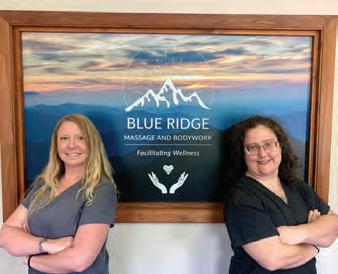
Feb. 9, 1978
Capt. Hall is declared killed in action.
Feb. 19, 1978
Another memorial service is held for Hall at First Presbyterian.
March 1, 1985
Hall’s parents say they’re still waiting, and still hoping. Hall’s father, Birdie, dies later that year.
Jan. 11, 1993
Hall’s mother says she hasn’t given up hope for her son.
May 1995
A joint field activity team locates Hall’s crash site.
July 1996
A search of the crash site is conducted to recover evidence.
1998-2020


A number of investigation and recovery efforts are conducted, including by the Defense POW/MIA Accounting Agency (DPAA).
Dec. 4, 2007
Hall’s mother, Reeney, passes away.
March 2021
Another search of the crash site recovers possible human remains.
November 2021
Hall’s remains are repatriated to the custody of the DPAA.
March 23, 2023
The DPAA declares both Hall and his pilot DeSoto accounted for, after making positive identifications of their remains.

“And maybe that will help start the trail of our missing being recovered. Anything that does come back, we refer right over to DPAA.”
Founded in 2015, the Defense POW/MIA Accounting Agency (DPAA) is an agency within the Department of Defense that is responsible for recovering American military personnel from conflicts as distant as World War II and as recent as the Gulf War. Contemporary cases are handled by the Armed Forces Medical Examiner System while the DPAA functions as more of a cold-case unit.

Dr. Gregory Berg, who’s been with the DPAA since 1999, is a case manager; of the thousand-odd cases in the DPAA system at any one time there are few Berg hasn’t touched in some way.
In 1995, shortly after the VVA Veterans Initiative Program began, Hall’s crash site was rediscovered in the Giang District of Quang Nam Province near the Laotian border and mere
minutes from the airbase DeSoto and Hall departed.
Vietnamese and American search teams, including the DPAA, conducted a number of investigative and recovery efforts over the intervening 25 years until in March 2021, a Vietnamese team was able to gather material evidence and possible osseous remains.
“We have spent about the last decade or so working in partnership with the Vietnamese government to establish Vietnamese excavation teams that prosecute and excavate sites for us in Vietnam, in areas that typically we aren’t allowed to go to and/or areas that are deemed too hazardous or too difficult to get into by our typical methods,” Berg said.

Hall’s crash site was on a “really, really steep hill,” says Berg. The Vietnamese team searched a 400 square-meter area and gathered evidence that established the identity of the aircraft, which in turn tied DeSoto and Hall to the site.

The team also found two bone fragments.
In these types of cases, all of the evidence is then subjected to a joint forensic review process, where the U.S. and the Vietnamese come together to determine the likelihood of the remains being from a U.S. loss, as opposed to a local loss.
Berg just so happened to be in Vietnam as part of the joint forensic review process for DeSoto and Hall.
“We looked at those together, and we decided that those two pieces of bone had a high likelihood of being one of the two U.S. aviators aboard that aircraft,” said Berg. “They were repatriated to the United States at that point.”
From there, the DPAA attempts to make a definitive identification of the remains, based on the case information that accompanies them.

“One of our shortest identifications ever, I think, was like four days, probably about 10 or 15 years ago,” Berg said. “But some cases can take 25 or 30 years. It all depends on the type of information that you have at hand.”
Advances in DNA technology make identification possible in cases where, even 20
years ago, it wouldn’t have been. Fragments as small as a fingernail can now yield important results.

“In this particular instance, this case was relatively straightforward,” Berg said. “It came in and had two solid pieces of bone that were eligible for DNA testing.”
Three separate DNA tests were performed on the remains.

“In this case, we just got incredibly, incredibly lucky,” Berg said. “Both fragments went to opposite individuals. It was just really kind of amazing, and happenstance.”
Unknowingly, the Vietnamese search team had provided identifiable remains for both DeSoto and Hall. The entire process took less than two years.

DeSoto, promoted to colonel while missing, was buried at Golden Gate National Cemetery on June 30.
“He was a great guy and he believed in what he was doing,” his wife, Joyce, said. “He loved to fly, and he loved being an American, that was his life.”
Berg remarked that in the case of Hall, the DNA results were exceptionally strong. The remains, he said, are 2.75 trillion times more likely to be Hall’s than anyone else’s. DeSoto’s results weren’t as strong, but were still irrefutable.
“I’m very proud of this one,” Berg said. Part of the DPAA’s mandate stipulates that next of kin be notified within 48 hours of a positive identification, which for Hall happened on March 23.
For Julia, receiving the news was like removing a scab.

“I just was thinking that I would get married and have children and that I had always loved North Carolina,” she said. “Fred was a joy in my heart and has always been, and I’m sorry that we did not have a chance to have the life that we both dreamt of.”
On Oct. 8, almost 49 years to the day since “Fred Hall week,” Frederick Mervyn Hall will return to Waynesville for the last time, and for the first time in nearly 55 years.
SEE HERO, PAGE 12
Missing in action for more than 54 years, Air Force Capt. Frederick Mervyn Hall of Waynesville will return home for a memorial service and burial in early October. All of the events are open to the public, but times could change depending on weather and traffic. If you’d like to pay your respects to Hall and his family, here’s how you can do so:
Hall’s arrival will take place at Greenville-Spartanburg International Airport in South Carolina around 1:30 p.m. before escort back to his hometown via motorcade. Under normal conditions, the drive takes about two hours. Those who wish to welcome him home are encouraged to gather near Wells Funeral Home.
A memorial service will be held at Hall’s church, First Presbyterian, at 11 a.m. The memorial service is open to the public, but capacity is limited. At the conclusion of the memorial service, those who wish to pay their respects should line Main Street as the procession makes its way to Green Hill Cemetery. The graveside service will be open to the public, but parking can sometimes be a problem so plan ahead. After the graveside service, a reception will be held at Wells Funeral Home. The reception will be open to the public.

Waynesville’s Historic Preservation Committee will present to the Town Council a resolution declaring that week “Fred Hall week.”
Civic organizations, community groups, veterans associations and people from across the region will line Waynesville’s Main Street to welcome Fred home as he arrives via motorcade from Greenville Spartanburg International Airport.
Vietnamese prisons, some of them with late U.S. Sen. John McCain, after being blasted out of his F-105 Thunderchief in 1966. McNish described his astonishment at learning how some returning veterans had been treated before he was released during Operation Homecoming in 1973.
“They come home from serving their country, putting their life on the line and they come back to a country where they’ve got to take their uniform off before they go out in public,” he told Blue Ridge Public Radio in 2018. “They get spit on, they get yelled at, they’re called baby killers. It’s just absolutely atrocious.”
Greg Daddis, who served in both operations Desert Storm and Iraqi Freedom, explained why.


cites the poor treatment of some Vietnam veterans as one of the reasons for her continuing work.
“The loudest voices are often the ones that get the most attention. That’s true in today’s world, as well. So even if it’s a minority voice, a comparatively small number to the larger American body politic, that’s what happens. And that’s what happened in those days,” she said. “A lot of what you’re seeing has been my way of apology to Vietnam veterans, to be welcomed back home.”
One of the positives to come from the Vietnam War, McNish said, was the reflection years later that there’s a difference between the policy and the people entrusted to carry it out in the field.
“[What] we have learned from that experience is that you don’t blame the soldier for the war,” he said. “You see soldiers ... today, walking proudly in public in their uniforms and being told ‘Thank you for your service.’ That, to me, is a great blessing.”
decades that Julia has been able to draw near to him.
“My last occasion with Fred at the airport was so traumatic. I didn’t know if I’d ever see him again,” she said, choking back tears. “This is his homecoming. That’s what all this is about. It’s all about Fred and who he is and how he made a difference in the world. Now he’s coming home to be laid to rest with his mom and dad, and me.”
Earlier this year Killian and funeral home owner Wells Greeley secured permission from the town to conduct a rare double-deep burial in Green Hill. Fred will be interred first, and when it comes time for Julia to join him there, she will.


“I love him and I’ve missed him,” she wept. “I say, ‘What if? What would our lives have been?’ There was no end to the story. But it’s God’s plan, and He knows best. And I accept it.”
Not every Vietnam veteran — living or deceased — was welcomed home the way Fred will be.
Macon County native Tom McNish spent more than six years in brutal
“I think it’s an example of the larger frustrations over policy,” he said. “And I think for those Americans who felt that the policy had gone awry, returning soldiers were visible representations of that policy and they kind of lashed out against them.”

Ann Mills Griffith, chair of the League,
On Oct. 10, Hall will be laid to rest with full military honors in Waynesville’s historic Green Hill Cemetery, not far from his father, Birdie, and his mother, Reeney, who died in 2007.
“I thought long and hard,” Julia said. “I thought that I would like for him to be at Arlington [National Cemetery] to honor him, but in my heart, I thought I would like for him to be with his mother and his daddy.”
It will also be the first time in five

All this time, Julia said her faith sustained her and promised her a joyful reunion with Fred, and with Birdie and Reeney and Minnie and George. Even today, Julia can see clearly in her mind her own version of what it truly means when a hero — when her hero — comes home.
“I’m standing on the balcony of my apartment at the Spartan Arms on North Alvernon Way in Tucson,” she said. “And I’m watching the Phantom jets fly across the sky, coming into Davis-Monthan to land, and for Fred to get out of the plane and come home for dinner.”


After the Parents Bill of Rights passed the General Assembly in August, local boards of education are determining how to align school policies with the legislation. Swain County Schools will have to revise several of its existing policies to come under compliance with the new law.

“We are starting that process, but there is a tremendous amount of work,” Swain County Schools Superintendent Mark Sale told the Swain County School Board during a Sept. 11 meeting.
The controversial Parents Bill of Rights, Senate Bill 49, bars instruction on gender identity or sexuality for students in kindergarten to fourth grade. These subjects have never been taught in these grades. In addition, the bill would require schools to notify a parent if their child changes their name or pronouns.
Among the other parental “rights” in the bill are the ability to skip sex education classes, obtain medical or religious exemptions from immunization requirements, review statewide standardized assessment results, inspect public school textbooks, access information on promotion and retention policies, receive report cards on a regular basis and review materials their child has borrowed from the library.
As the law currently reads, it is supposed to have taken effect with the start of the 2023-24 school year.

“I am hearing from strong, dependable sources that they are going to extend that deadline for starting because it came to a select committee and it takes so much work to get all these pieces together,” said Sale.

In a legislative update, the North Carolina School Board Association said there are several “serious timing issues’’ that it is working to address. By the time SB 49 became law, students across the state of North Carolina were already in school, leaving no time for implementation. However, school boards like Swain’s have now received

legal advice that they do not need to rush to comply with the law; rather, that it is more important to get the compliance right.










There are six policies that Swain County Schools may need to revise to comply with the law. The most significant changes to school board policies will be those that address parental involvement.
“The policy revisions that I already shared with you came directly from the North Carolina School Board Association,” Sale told the school board. “They sat down with state law 160 and decided where these pieces flow. The largest adjustments are in 1310.”
Policy 1310, parental involvement, “recognizes the critical role of parents in the education of their children and in the schools.” This policy outlines parental involvement plans that schools must have in place, communication and conferences with parents, opportunities to withhold consent or opt out of activities and required parental permission.
“The policy is 1310, the revisions on that are extensive,” said Sale. “I need more time to look at that, and I need time to wait until the legislature decides what they’re going to do with the activation dates for that policy.”
Another of the policies that will be up for revision is 5210, distribution and display of non-school material. This policy addresses display of compliant political signs in the right-of-way during designated periods, distribution and display by students, distribution and display by non-students, distribution and display standards for non-school materials and procedures for requesting distribution or display of non-school materials.
“All of the revisions are coming straight out of the Parents Bill of Rights. If it wasn’t for the Parents Bill of Rights, we wouldn’t be looking at those other six policies with the same intensity that we are,” said Sale.
For many school boards, including Swain, pre-existing board policies address several of the rights laid out in the new law. Swain County Schools will hold a work session with the board to address these policies and figure out how to come under compliance.




Hawthorn Heights WNC, a nonprofit founded in Bryson City, announced it has purchased its current facility from Children’s Hope Alliance.
“Hawthorn Heights was initially established in 1976 through a grassroots movement of local citizens who understood the necessity of having a safe, nurturing home for children when they had nowhere else to turn,” said Executive Director Kara Long. “Regaining local ownership of the home and safeguarding its future has been a key focus since we reopened the program in 2021.”

Purchase of the nine-bedroom Swain County home was made possible through substantial grant awards received from Dogwood Health Trust, as well as the Evergreen Foundation.
“It’s an honor and a privilege to serve the children of this community who are experiencing difficult transitions in their lives,” said Ralph Murphy, Hawthorn Heights WNC board chairman. “We will continue to provide quality care to youth in need, and we look forward to expanding our services in order to strengthen the continuum of care in western North Carolina.”
Anyone seeking additional information about Hawthorn Heights, or anyone who would like to make a tax-deductible donation, can visit hawthornheights.org or call 828.488.6512.
Voter turnout came in at 53.9% for the Eastern Band of Cherokee Indians’ Sept. 7 election, according to numbers the Board of Elections released last week, a dip from the 57.1% turnout observed during the last chief election in 2019.


The offices of principal and vice chief were on the ballot, as were all 12 Tribal Council seats, three School Board seats and referendum questions asking voters to weigh in on legalizing cannabis and issuing permits for the sale of mixed beverages. Both questions earned overwhelming approval from voters but required a 30% turnout to be valid — a benchmark they passed easily. Turnout was 52.4% for the cannabis question and 52.1% for the mixed drink question.
Both referenda drew more voters than the race for principal chief, which had a turnout of 51.6%. By contrast, the 2019 chief race between Richard Sneed and Teresa McCoy had a turnout of 56.5%.
In most communities, turnout was higher than 50% or just a percentage point below it. The exception was Cherokee County, where only 39.5% of 385 registered voters participated in the election. Big Y had the highest turnout, with 58.7% of 380 voters.
The two biggest communities — Birdtown, with 1,725 voters, and Wolfetown, with 1,221 — had turnouts of 57% and 56.6%, respectively.
“It wasn’t a late night counting votes. There wasn’t enough of a margin to have a recount or a protest or anything,” said Board of Elections Chair Cyndi Chandler. “So, I think overall, we did well with it.”
No protests alleging election irregularities were filed within the five-day window outlined in tribal law.
A big change this year was the availability of expanded absentee voting. In previous years, tribal members have had to meet one of five specific criteria laid out in tribal law to qualify for an absentee ballot, but last year Tribal Council changed the ordinance to allow any person who is “unable to return to Cherokee/polling place to cast their votes” to request an absentee ballot.
Absentee voting still accounts for a relatively small proportion of votes — 2.7% of those cast in the principal chief race, for example — but was more than double the level recorded in 2019. Of the 3,867 votes cast in the 2019 race for principal chief, only 1.1% were absentee.
Despite the uptick in absentee participation, Chandler said, absentee voting was “a
State and local officials are reminding people during “Child Passenger Safety Week” to buckle up their youngest passengers because car crashes are still a leading cause of death for most children.
The N.C. Governor’s Highway Safety Program, the N.C. Department of Insurance, Office of the State Fire Marshal, Safe
little slower than what we expected.” She said her office sent out 185 absentee ballot applications for the General Election, of which 89 were returned.
“I think we can do some better stuff with that, and we were talking about how we can update that for people,” Chandler said.
The way the process works now, voters have to call and request an absentee ballot
“Several of them thought that they just needed to do an application one time, it just covered the Primary and General Election, and it didn’t,” she said. “They had to do a second one. And that’s something we’re looking at.”
Chandler said the Election Board is in the early stages of discussing the possibility of online absentee voting applications. The board is also beginning discussions on potential changes to the tribe’s election ordinance, an opportunity that comes up once every two years. Tribal law prevents the ordinance from being changed during an election year, defined as Oct. 1 through Sept. 30 of a year that includes a regularly scheduled election. After this year’s winners are sworn in Oct. 2, Tribal Council can consider changes to the ordinance through Sept. 30, 2024.
File photo
application form, which is then sent to them and must be mailed back completed ahead of the deadline. Then an absentee ballot is mailed to the voter, which also must be returned on time for the vote to count. Each application is good for only one election, so a voter who successfully completed the process for the June Primary Election must go through it again to vote in the September General Election.
Kids NC and others hosted a press conference in Greenville on Monday to underscore the importance of child passenger safety. During the child passenger safety clinic, experts also demonstrated how to properly install car seats.
Governor Roy Cooper has proclaimed Sept. 17-23 as “Child Passenger Safety Week” in North Carolina.
While car seats and boosters provide crash protection for infants and children, car crashes are still a leading cause of death for children between 1 and 13 years old. According to Safe Kids North Carolina, nearly 100 children under age 14 die annually from
One such change Chandler would like to consider is a section on special elections. Tribal law used to contain such a section, spelling out the mechanics of how and when to hold elections filing vacancies on Tribal Council or executive office. But that section was removed as part of an election ordinance update Council did in 2018. Special elections are rare, with none occurring in recent memory — until 2022 and 2023, when Tribal Council had three vacancies in less than three months. Two special elections were held to fill them.
“Let’s just get it back in there,” Chandler said of the special elections law.

vehicle-related crashes, and about 45,000 minors are injured and need medical treatment.

More than 3,000 nationally certified child passenger safety technicians across the state teach parents and caregivers how to properly install car seats in their vehicles. Thanks to these and other child safety efforts, North Carolina maintains its position as having one of the nation’s strongest programs promoting child passenger safety.
For more information, visit NCDOT’s webpage on child passenger safety.
Multiple highprofile referenda required a certain number of voters to turn out to pass.


 BY HANNAH MCLEOD STAFF WRITER
BY HANNAH MCLEOD STAFF WRITER


With accountability data released from the North Carolina Department of Public Instruction, all charter schools in the Smoky Mountain News’ fourcounty coverage area showed an increase in the percentage of students passing state exams during the 2022-23 school year compared to 2021-22 school year.


The accountability report for the 2022-23 school year is only the second such report since the 2018-19 school year to feature all elements of the state’s accountability framework, including growth designations and performance grades, due to the disruptions to teaching and learning caused by the pandemic.
“It’s hard to overstate the impact of the pandemic,” State Superintendent Catherine Truitt said in a press release, “but teachers across North Carolina are working harder than ever to help students recover, and more importantly, advance in their learning. We owe them our gratitude for meeting this challenge to improve outcomes for students.”
For the first time since the pandemic, over 50% of elementary and middle school students in North Carolina achieved grade level proficiency in reading and math.
The data gives every individual school a letter grade, A through F, based on each school’s achievement score from assessments such as end-of-grade and end-of-course tests, English language assessments, ACT scores, four-year graduation rates and students’ academic growth. The assessments account for 80% of the letter grade and growth accounts for 20%.

“The A-F school performance grades that schools received for 2021-22 and in 2022-23 were affected by the formula used to determine those grades because student performance on the state tests far outweighs the credit schools earn for the progress students make on the same tests from one year to the next,” said Truitt. “Eighty percent of the grade is for the percentage of tests earning a score of at least grade-level proficient; 20% is for growth, measured by a statistical model that compares each student’s predicted test score, based on past performance, against his or her actual result.”

Charter schools are public schools authorized by the State Board of Education and operated by independent non-profit boards of directors. In North Carolina, charter schools are funded primarily through state and local tax dollars that follow students as they move through the public school system. Charter schools receive funding depending on their average daily membership — the number of students attending a school in any given year — and the funding levels of the local education agency or the school district.
Shining Rock Classical Academy,





Haywood County’s only charter school, served grades K-10 during the 2022-23 school year. It received a C letter grade for the second year in a row with a 61% performance score, just under Haywood County Schools’ performance score which had 64.4% of students proficient on state exams, meaning they achieved grade level proficiency. This composite performance score showed a significant increase from the prior year when 54.9% of students were proficient on state exams. The school met growth standards overall and exceeded growth standards in mathematics.

Summit Charter School in Jackson County serves grades K-12 afer graduating its first class of seniors in the spring of 2022.


So far into its high school endeavors, Summit has maintained a 100% graduation rate, with 100% of students also earning acceptance to college, including 71 offers of admission from 31 colleges and universities. Of Summit graduates who have gone on to college, 30% are first-generation college bound.

Summit received a C letter grade for the second year in a row with 69% of students reaching proficiency on state exams. This score was well above Jackson County School’s performance composite which, for the 2022-23 school year showed 47.7% of students were proficient on state exams. Summit Charter School met growth standards for the year.

These data represent an improvement for Summit; during the 2021-22 school year the school did not meet growth standards and only 54% of students achieved grade level proficiency.
While Summit received a C letter grade overall, it scored a B in the area of mathematics.
Mountain Discovery Charter School in Swain County is a K-8 school. It also received a C letter grade, also for the second year in a row. But while the school did not meet growth standards in the 2021-22 school year, it exceeded growth standards in the 2022-23 school year. The school’s composite performance score shows 63% of students were proficient on state exams. This is an increase from the 2021-22 school year when 55.8% of students passed state exams and well above Swain County Schools’ performance composite score of 48.9%.

The Sylva Board of Commissioners recently received a presentation on Safe Haven Boxes — a program that allows for the anonymous surrender of infants. The presentation was purely informational, and more research is needed before commissioners will make a decision about the program.
“When you have women in crisis, whether it’s from something physical, financial, emotional, that desire to remain anonymous and safely surrender their child is just more prevalent,” said Rachel Huffman, health advocate and emergency medication specialist. “I’d like to see that become an option for our community and I’d like us to be able to set that standard.”
In order to surrender a baby in North Carolina, someone must present themselves to law enforcement or other emergency medical personnel. Once they do so, a lengthy process is set in motion in which that person and the infant are taken to a hospital and social services becomes involved.
“People can shy away from that because they fear being prosecuted,” said Huffman. “You’re talking about women who are typically on the younger side, who are in mental health crisis. This puts the focus on the baby and getting that baby somewhere safe.”
Safe Haven Boxes, provided by an organization of the same name, can be installed outside government or medical buildings that are manned 24 hours a day, such as Sheriff’s offices, police departments, fire stations or emergency rooms. Someone can come and leave a baby in the box anonymously. Once the baby is in the box, an alarm will sound after two minutes which notifies emergency personnel. Within 30 minutes, the baby is taken to an emergency room for a full physical. Inside the box there is a packet of information and resources available to the person surrendering the child. There are also security cameras in the box and outside the box in case a crime occurs, or the child being surrendered is deceased. The infant must be within
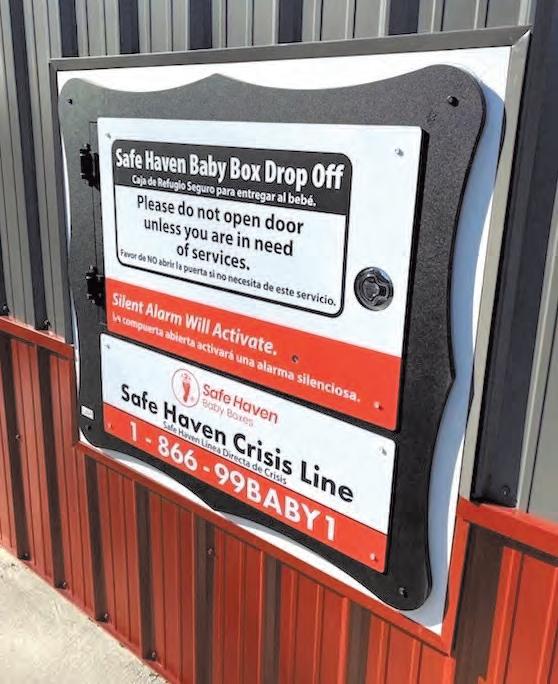
seven days of birth to be surrendered.
“As a part of my position with HCA [Hospital Corporation of America] and with my volunteering with Safe Haven, I would also be listed as an emergency contact inside
Safe Haven Box, located at its Sheriff’s Department. The closest Safe Haven Box is located in Knoxville, Tennessee.
“If we were able to make this a reality, we would be the second box in North Carolina,” said Commissioner Natalie Newman, the official responsible for organizing the presentation from Huffman.
Because North Carolina law requires infants to be surrendered to law enforcement or emergency personnel, Sylva would have to pass an ordinance that would allow for the placement of a Safe Haven Box and anonymous surrender.
In addition to the baby boxes, Safe Haven also provides a hotline for women in crisis, which is available on the organization’s website, and is also posted on all Safe Haven boxes.
“Having a Safe Haven Box results in more people calling the crisis line that’s associated with it,” said Huffman.

them,” said Nestler. “Currently, North Carolina law gives you the option of surrendering a child to certain law enforcement, emergency personnel, but it’s always to a person.”
That’s important, Nestler said, because sometimes people don’t know that they are terminating parental rights when placing a baby in a Safe Haven Box. On the other hand, emergency personnel are trained to relate that information to people surrendering an infant in person.
“Also, a public health official can guarantee that the woman is not surrendering her child through coercion, which is another problem,” said Nester. “I think that’s the reason North Carolina law is written that way and I think the reason you need an ordinance for this is to somehow circumvent that requirement or force the state into changing that requirement.”
Nestler also pointed out that the Safe Haven hotline does not get very good marks from public health officials.
the box to take a mother anonymously to an emergency room should she need it,” said Huffman.
After the surrendered infant has been medically cared for, they are immediately put in the care of Health and Human Services to be placed in foster care. Alternatively, Safe Haven also has a list of people signed up with the organization for private adoptions.
“A lot of these women crave to remain anonymous after sexual assault,” said Huffman.
According to information provided by Safe Haven Boxes, there are 165 active baby boxes in the United States, and over 100 babies have been safely surrendered through the organization. Ashe County is the only North Carolina County that currently has a
Cost for the box is typically $11,000 to $16,000 depending on its location. The Safe Haven organization pays for those installation costs.
“We’re having trouble keeping sexual assault survivors in the area for healthcare, and with that becomes even more of a stigma and people become afraid to present themselves,” said Huffman. “A lot of people aren’t educated about safe haven laws, they don’t understand, they just fear prosecution around those and even having a box present allows the opportunity to educate the community. The maternal vulnerability score for Western North Carolina for poor pregnancy outcomes are very high.”
Mayor David Nestler urged board members to do further research before moving to adopt an ordinance and install a box.
“I think these boxes are very well intentioned, but I do have some concerns about
In order to surrender a baby in North Carolina, someone must present themselves to law enforcement or other emergency medical personnel.
“Those are all valid concerns,” said Huffman. “I think we live in a changing society. Some of our state laws don’t necessarily meet the needs of that changing and younger society and the challenges they’re going to face and the way they may maneuver socially.”
“If you all want to move forward with this, I’d make sure that Eric [Ridenour, board attorney] researched those legal questions quite thoroughly and that you consider too the opinions from other public health officials on these boxes.”
The board will revisit the issue after conducting further research on the legal side, as well as communicating with the health department to its input.
The field of candidates for the two Maggie Valley alderman seats up for election this November just got a little smaller, after one candidate dropped out just two days before a preliminary hearing into her alleged residency issues.
Eve Barrett is registered to vote at a property on Bridle Drive, which is within the town limits of Maggie Valley. However, a neighbor told the Smoky Mountain News back in August that Barrett and her husband actually live on Grandview Cliff Heights, which is not within town limits. Candidates must live within the municipality in which they run for office.
An investigation by SMN showed that the property where Barrett claims residency is available as a short-term rental on major vacation websites. Barrett confirmed that, but told SMN she stays there between rentals.
The Barretts also own a home in Pinellas County, Florida, for which they claimed a homestead exemption from 1996 through 2022.
The exemption application requires applicants to affirm that the exempt property is their primary residence; however, Barrett applied to become a member of the Maggie Valley Zoning Board of Adjustment in July 2021 using the Bridle Drive address and was appointed as an alternate member of the board that November — all before she registered to vote at the Bridle Drive address in April 2022.
Barrett voted twice in from the Bridle Drive address in 2022 and became a full member of the ZBA this past February.
Haywood County Board of Elections Deputy Director Doyle Teague confirmed that Barret had dropped out earlier today, and that Jeff Lee, the Maggie Valley resident who filed
the election protest against Barrett had withdrawn his challenge late on Sept. 13.
On Sept. 12, Haywood BOE members voted unanimously to schedule a preliminary hearing on Lee’s challenge for this coming Friday, Sept. 15.
That hearing will likely be canceled, as there’s now nothing to hear.
Administrators from the Town of Maggie Valley told SMN on the afternoon of Sept. 19 that she resigned from the ZBA.
Allen Alsbrooks, Phillip Wight and Tim Wise are left to compete for the two aldermanic seats, one of which is currently occupied by Wight, in the November municipal election.
When reached for comment on this story, Eve Barrett declined.



















Roughly a decade ago, Mike Wade heard a quote from successful industrialist and philanthropist Andrew Carnegie: “I spent the first half of my life making money, and the second half of my life giving it away to do the most good and the least harm.”
In that moment, Wade made a commitment to try and follow Carnegie’s example.
“When I first heard those words, I wasn’t in a position to do it yet,” Wade recalled. “But I can now, and I want to do what I have a passion for – and that’s helping people.”
Guided by that desire, Wade recently put the wheels in motion to create a $500,000 scholarship endowment at Southwestern Community College, the single-largest cash commitment in the SCC Foundation’s 50-year history.
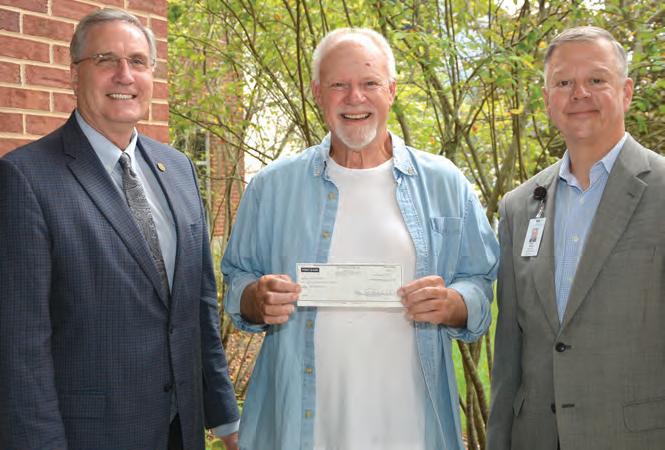
The gift will be used to provide a ‘hand-up’ to SCC students who demonstrate financial need, hold and maintain a grade point average of 3.0 or better — with preference given to individuals who’ve graduated from or are participating in Circles of Hope of Jackson County.
By setting up the “Gale Lee Wade, William Edwin Roosenberg and Larry Stanberry Endowed Scholarship Fund,” Mike Wade is honoring three men who deeply influenced his own life.
Gale Lee Wade was Mike’s father, and local businessmen Roosenberg and Stanberry helped get Mike Wade started in the insurance field.
Helping to streamline the process of setting up the scholarship fund was an already strong relationship he’d developed with a couple of fellow Rotarians: Dr. Don Tomas, SCC’s president, and Brett Woods, director of the SCC Foundation. “They are two of the main reasons I’m doing this,” Wade said. “They’re very active in the community, and I’ve gotten to know them both very well.”
The first scholarship will be awarded next fall, and Wade expressed a desire to meet the recipient in person for the purposes of providing encouragement.
For more information about the SCC Foundation and the various ways it supports students, contact Woods at 828.339.4241 or b_woods@SouthwesternCC.edu.
The lumber boom of the early 1900s brought jobs to the WNC mountains, especially for those residing in the Forney Creek Township.
The Norwood Lumber Company logged the Forney Creek watershed moving the logs by rail with their tracks crisscrossing the valley from one end to the other.
Jerry Ledford will present “Forney Creek, the Norwood Lumber Company and It’s Railroads” at the Oct. 5 meeting of the Swain County Genealogical and Historical Society.
Ledford’s ancestral roots run deep in the Forney Creek area. Many of his ancestors were employed by Norwood, including his paternal grandfather, Lewis Ledford, one of the mill’s superintendents; Lewis’s brother-in-law, Louis Carr, one of Norwood’s owners; and several of his great uncles.
Over the years as he came to know more about his family history, Ledford’s interest in railroading naturally merged with his heritage founded in the logging industry. Working along with the late Ron Sullivan, they traversed the mountains finding old logging camp sites, railroad grades, abandoned rails and skidders and other remains left behind of the days gone by.
From those adventures, Ledford and Sullivan coauthored the series of books entitled “If Rails

In his presentation, Ledford will share rare photographs of the Forney Creek area from his family’s collection, as well as those from Swain County native Noah Haney, one of Norwood’s veteran railroad engineers.
The presentation will take place at 6:30 p.m. on Oct. 5 at the Swain County Regional Business Education and Training Center. Conversation and refreshments will follow the presentation.
During a pinning ceremony back in May, Amy Banner, Southwestern Community College’s nursing director, read aloud a sample question from the National Council Licensure Examination for Registered Nurses (NCLEX-RN).
Nursing graduates in the first few rows grinned knowingly. The rest of the crowd chuckled at the medical lexicon.
Within three months, all 25 of the graduates honored that day would go on to successfully pass that challenging exam on the first attempt and are now officially registered nurses.
“We are elated,” said Amy Banner, SCC’s Nursing Program Director. “All the hard work of our
students and faculty is paying off. It was a total team effort between tutoring and extra hours in the office, and everyone being willing to pitch in all the time.”
Southwestern has been training nurses since 1967 when it launched a “Practical Nurse Education” track. SCC serves Jackson, Macon, Swain counties and the Qualla Boundary and also regularly draws students from outside the region.
“At Southwestern, we consider it an honor to train the next generation of healthcare workers for our service area and beyond,” said Dr. Don Tomas, SCC’s president. “Our instructors challenge students because they need to be ready to succeed their very first day on the job. We’re extremely proud of all our 2023 graduates because they worked hard and earned this, and we are also very proud of our faculty members who supported the students every step along the way.”
For information about Southwestern and the programs it offers, visit southwesterncc.edu, call 828.339.4000.

East Tennessee State University purports to devote considerable resources into uplifting the mental health not only of faculty, staff and students, but the Appalachian Highlands region, as well.
Earlier this month, ETSU President Dr. Brian Noland signed a proclamation designating September as “Suicide Prevention Awareness Month.”
“Nationally, campuses are witnessing a mental health crisis,” said Noland. “The recognition is not just an acknowledgment of the seriousness of the issue but a call to action for each one of us.”
The university promotes a range of activities and steps to achieve better mental health. That includes physical activity, a balanced diet and adequate sleep. Forest walks, yoga classes and a workout at the Basler Center for Physical Activity are other options to boost mood and emotional well-being.
For additional details about National Suicide Prevention Month, visit nami.org.
Sabrina Delk has joined Mars Hill University as the director of the new Center for Entrepreneurial Leadership.
In that role, she will be responsible for recruiting students, organizing and executing extracurricular activities and engaging businesses to help provide students with the real-world skills they need for a seamless transition into the professional world. She also will oversee the planning and execution of the center's programs, including a small business incubator, Main Street economic development facility, community outreach, and financial literacy, along with student scholarship, internship and consulting programs.
Delk, a veteran project manager and development professional, comes to Mars Hill from the North Carolina Outward Bound School, where she served in several roles, most recently as development director. She received her undergraduate degree from the University of South Carolina and her master's in public administration from Clemson University.
"I'm excited to begin working closely with students to help them succeed," Delk said. "My personal values of community, challenge, learning and compassion perfectly align with Mars Hill and the Center for Entrepreneurial Leadership."
The Center for Entrepreneurial Leadership includes Mars Hill's entrepreneurial leadership academic program. It aims to educate a new, diverse generation of leaders to foster an entrepreneurial mindset to businesses in Western North Carolina.
"It is not just about how to start a business," said James Heinl, a professor of business, "but how to impact any business in any position by displaying the characteristics of successful entrepreneurs."
One early project for the center is a case competition for high school students on September 30. Teams of one to four students will employ key business skills such as research, analysis, presentation and creativity as they compete to develop the best solution to a business case. The competition will award cash prizes to the top teams and their schools. Information is available atwww.mhu.edu/case-competition.
What’s behind Republican leaders’ insistent push to legalize multiple forms of gambling – from online sports betting to casinos and video poker kiosks — despite resistance from caucus members, core Republican voters, pastors and sheriffs? What happened to concerns about crime, addiction and victimizing the poor?
It could be years before we know the full story. After NC House Speaker Jim Black’s conviction two decades ago, new research only emerged during his sentencing hearing that helped explain his adamant defense of video poker: he pocketed a $500,000 “loan” from the industry’s top lobbyist.
Prosecutors in Black’s corruption case concluded, “It’s all about money and the lust for power.”
Are we seeing a repeat of that scenario in the new push for gambling?
Two reports have already revealed that lawmakers are getting a surge in campaign contributions from gambling-related donors, even during this legislative session — an eye-popping $1 million in three years, with most of that in the past year.
Now I’m finding that a surge of gambling money is also flooding the “dark money” groups that have become increasingly important in North Carolina elections.
Across the nation, politicians like Senate leader Phil Berger and Speaker Tim Moore are increasingly relying on
To the editor:
Remember the saying from Vietnam days that we had to destroy the village in order to save it? Well, now the Democrat party and their minions are destroying democracy in order to save it by trying to eliminate the competition. We no longer live in the United States of America but in an unrecognizable banana republic. Of course, we have all the trappings of a functioning democracy. We have the theater of campaigns and elections, but no serious effort to ensure the integrity of them; we have those piously prattling on about “the rule of law” while inventing absurd legal theories to indict a former president while covering up the crimes of Joe Biden. Much more could be said along these lines, but I want to indicate two possible dates at which our democracy died.
The first date is Jan. 6, 2021. No, no, no, not because of the so-called insurrection. This was a legitimate protest of a very unusual appearing election, to say the least, immediately after it was declared the most secure election ever and declared beyond the pale to question it. This is what is known as a tell. Nancy Pelosi and others engineered a trap for the J6 protesters by refusing President Trump's request for National Guard troops and by keeping the Capitol Police in the dark by not sharing relevant information. There were many federal agents in the crowd along with Antifa trying to stir up the crowd and finally got a response when they, unpro-
these groups to win key elections and maintain their power. The dominant NC-based group is Citizens for a Better North Carolina (CBNC). Since its launch in 2020, it has funneled millions of dollars to a political firm run by former staffers of Sen. Berger for mailers and ads attacking Democratic candidates.
In October 2022, CBNC received its largest donation ever from an individual — a $1 million contribution from Jeff Yass, a Pennsylvania billionaire and gambling advocate, whose company owns the biggest block of stock in a sports betting company.
CBNC used money from Yass and other donors in 2022 to finance mailings that helped defeat three Democratic legislators whose votes killed a sports betting bill, 49-52. CBNC’s largest investment in a 2022 legislative race supported Bobby Hanig, a rare member of the House Freedom Caucus who voted for that sports gambling bill.
Despite its name, Citizens for a Better North Carolina is mostly funded by businesses through a maze of intermediaries that have flourished since the Supreme Court’s Citizens United ruling. In fact, 93% of CBNC’s money has come from the Virginia-based Good Government Coalition, which in turn has received 92% of its money from two national organizations devoted to electing Republicans — the Republican State Leadership Committee (RSLC) and GOPAC.
Both of those organizations raise millions of dollars each

voked, started firing stun and pepper spray munitions at the assembled people. Some of this was in an enclosed space which naturally would lead to panicked reactions. That is why it has been so hard to get all the footage aired of that day because it cuts against the narrative that democracy almost died except for the heroic efforts of law enforcement. The script was then flipped to where the election was not stolen but that there was an attempt to prevent the peaceful transfer of power. Seriously? No one was armed; how could it possibly happen? But now the protesters were traitors, and many are still denied their rights languishing in the Washington, D.C. jail. Yes, we have political prisoners here. So, what they have told us is that they can steal or rig elections, but we’re the bad guys for complaining. Democracy is dead — hello authoritarianism. QED. However, since the talk about insurrection and trying to prevent the peaceful transfer of power is so central to the argument by the authoritarians, maybe we can backdate the death of the republic to Jan. 20, 2017. No, no, no, not because of Trump’s inauguration but because of the refusal of the unelected bureaucracy and party leaders to accept the results of an election. They claimed Russian interference which has been long been proven to be a lie, but they keep lying about Trump and covering up all their misdeeds. But nobody calls them traitors or insurrectionists.
There is only one overarching issue in the 2024 presidential election. It is, are we going to be allowed to choose our candidates, or will
year from a variety of corporations, including tobacco and drug companies — and my research shows they are getting increasingly large amounts from gambling companies and associations.
Donations to RSLC and GOPAC just from the gambling interests with lobbyists now at the General Assembly topped $1.5 million from January 2022 to June 2023, more than twice what those donors gave the two organizations during 20202021.
The total includes: $50,000 from a unit of The Cordish Companies, which recently bought land for possible casinos in Rockingham and Nash counties; and $150,000 from the Illinois-based J & J Ventures and $35,000 from NC-based Grover Gaming, two major video poker vendors.
All three of those companies are new donors to GOPAC or RSLC. Executives at these companies are also suddenly becoming major contributors to the campaigns of North Carolina legislators, giving hundreds of thousands of dollars since January 2022.
Phil Berger and Tim Moore sit on the leadership committees of RSLC and GOPAC and actively work with each group’s donors. They keep telling us that gambling is a vital source of revenue for North Carolina’s future. Maybe they really just mean it’s a money source for their future.
(Bob Hall is a long-time analyst of campaign finance reports. A version of this column appeared in the McClatchy newspapers.)
they be chosen for us by those who despise us? Despite all the hue and cry about Trump being a fascist, he did not seek to “lock her up” even though it was obvious that Hillary Clinton broke the law. He was far more magnanimous that the Democrats could ever
and hold elections that can be trusted and, if not trusted, can be contested without slanderous impugning of motives. Those who decry the polarization of the country but who resist simple transparency and fairness forfeit their fitness to govern. Those who really want to
imagine themselves to be. There was so much concern then and in 2020 about not legally going after potential candidates in the presidential race. It would be unprecedented; it would trample on norms. Funny how none of that seems to apply now. If we want a restoration of “our democracy,” let’s let the voters decide without outside interference by lawfare
see the country back on track should vote for Donald Trump for president in 2024 whether you like him or not just to send a message that the American people will not allow their choices to be restricted by an unaccountable cabal of political and judicial hacks.
David Parker SylvaSometimes, it feels like we’re just nowhere in this life. It was like that for me in the early 1980s. I had dropped out of college and was just fumbling around in my hometown, taking whatever work came my way and living a life that was often vaguely self-destructive except when it was dangerously and specifically so.
After two or three years of that, I decided I had better straighten up and do something with my life, so I enrolled at Appalachian State University — about an hour up the road from my hometown — though I still had absolutely no idea what I would major in or where I was headed after college.
At that particular time, it was enough just to be somebody and to be somewhere. I would be a college student, that was enough for me, so I leaned into it and for the first time in my life, I became a good student.
There is an old saying, often attributed to Buddha that says, “When the student is ready, the teacher will appear.” I must have been ready, because that is when Chip Arnold appeared. In his publications, he is known as Edwin T. Arnold, although everybody called him “Chip,” including most of the grad students and even some of the more confident undergrads. But he was always Dr. Arnold to me.
When I was making out my class schedule, I really had no idea what classes to take other than the ones I had to have to complete my general education core, but since I had always enjoyed reading and writing, I was drawn to English classes as electives. That’s how I ended up taking a Southern Literature class with Dr. Arnold that focused on the writings of William Faulkner and Flannery O’Connor.
I had no idea that Dr. Arnold was an actual Faulkner scholar. Unlike some professors, he did not view the classroom as a place where students were permitted to behold his brilliance for an entire semester, and then reflect it back in faithful and reverent papers that artfully regurgitated his own ideas back to him.
Rather, he not only encouraged us to think for ourselves and form our own opinions on the stories and novels we read — he required it. It’s so much easier to tell people what you think they want to hear than to think through what you really think and feel about something, whether the topic is relationships, politics or William Faulkner.
Chip Arnold’s classroom was a cross between a church and a playground, a place for us to meet twice a week and share our ideas and beliefs about whatever we were reading, while also playing around with a range of possibilities we had never consid-
ered.
His classroom was a comfortable place, but it was also alive and exciting and unpredictable. We felt challenged, and sometimes we felt smart. Even the most bizarre interpretation or off-base remark was weighed and considered, perhaps gently redirected without even a hint of a suggestion that the student was foolish for ever having thought such a thing.
For the most part, we came to class energized and prepared, but there was one day when, no one seemed to have much, if anything, to say. Dr. Arnold began class as he usually did, offering a little bit of context or preamble before posing questions to promote class discussion.
After several of these questions remained unanswered and the room became uncharacteristically awkward, Dr. Arnold sat down on the desk in front of the room, and then slowly turned and reclined on it “like a patient etherized upon a table,” arms outstretched and eyes closed.
This went on for a full minute or two before someone finally giggled to punch a little hole in the silence and then someone else spoke through it in a small, tentative voice: “Dr. Arnold?”
For the remainder of the semester, there was never another question that lingered in the air for more than a few seconds before someone offered some opinion on it. On the last day of the class, which I had been dreading for at least two or three weeks, Dr. Arnold called me aside as students were streaming out into their summer breaks.
“Have you read this already?” he said, handing me a paperback of a book called “Outer Dark” by a writer named Cormac McCarthy. “Take it with you. You can just give it back to me in August when we come back for fall semester. I’d like to know what you think of it.”
He wanted to know that I thought of it. Can you imagine? The very idea that books could mean so much, that people could sit around discussing them for hours, that this was even thing. This discovery opened up a world that I had no idea even existed. The notion that someone could make a living leading such discussions was more than I could comprehend.
I have been in the classroom myself now for 35 years. On my very best days, when the students are leaning forward in their seats in my class trying not to talk over each other as we discuss Emerson, Hawthorne, Poe, or — yes, indeed — William Faulkner, I think of those long-ago days in Sanford Hall, when a skinny, small-town boy finally found he was somebody somewhere.
And I think of Chip Arnold, who appeared when I needed him most. He revealed a thrilling new world and then convinced me I could live there.
That is what the very best teachers do.
(Chris Cox is a writer and teacher who lives in Haywood County. jchriscox@live.com.)



went from there and found songwriters later in life.
SMN: Was music kind of an escape thing for you?
DM: Yeah, definitely. It’s a guarantee. You can put the song on and regardless of whatever is going on, that song or album is going to be there for you — it’ll just change your mood immediately.
SMN: So, you learn guitar, start writing some songs and playing a little bit.
DM: I didn’t sing for years. I was just a bedroom guitar player. I started singing with a good friend of mine, Dave Shoemaker. We played in a duo in Middlesboro, [Kentucky], and Cumberland Gap, Tennessee. I was 19 or 20. Bar gigs. Playing covers and some of our own stuff. We would fill threehour sets for very little pay. It was tough.
SMN: And then you become a sponge, soaking it whatever you can.
DM: Yeah, just kind of taking it in. Learning what to do. How to set up for a gig. The whole mechanics of playing a show. The layout of everything. And then, I had this funny realization one day. You know, as a young guy growing up, if you’re lucky enough to have your dad or grandfather [do a job] that they seem to like, you think, ‘Maybe that’s what I’ll do when I get older.”
But, my [grandfather] was a lineman for Kentucky Utilities and I was terrified of heights. So, there’s no way I was getting up in the bucket truck. And my dad worked at the Middlesboro Coca-Cola plant and family couldn’t work there. So, the two visions I had [of my future] got shot in the foot right off. [Laughs]. With music? I’m trying to make this work.
SMN: How’d you learn how to write songs?
DM: When I got into songwriting — when we were playing those bar gigs as a duo — we were both playing acoustic and doing cover songs. Townes Van Zandt. John Prine. I was listening to songwriters like crazy. [Songwriting] is being able to step away from all the modern amenities of life that I enjoy, that are comfortable, where you want to feel things, the real things in life.
I’m 29, but I’m old enough to remember [a time before] everyone having a cell phone. I remember that change happening when I was in middle school. Everyone getting a cell phone. High-speed internet. All of this modern stuff that’s expected now. I sort of like the callback of pencil and paper, everything completely analog.
Everybody feels some scope of everything, you know? How often that is or whatever version of it is, it’s different for everybody.
BY GARRET K. WOODWARD ARTS & ENTERTAINMENT EDITORStepping up to a lone microphone on a side lawn in Franklin, Dalton Mills plucked a couple guitar chords and said a few words before launching into his performance — the early evening sunset reflecting off Mills’ glasses, his voice echoing into the nearby mountains cradling the small town.
A rising singer-songwriter from Chattanooga, Tennessee, by way of Middlesboro, Kentucky, Mills was a fresh face last year to the Yonder Community Market live music series on the outskirts of downtown Franklin along a bustling Georgia Road. And yet, being in the presence of Mills conjures deep, genuine connectivity, this familiar, haunting voice of honest truths and pure intents. At the Yonder gig, Mills’ held court amid a more than captive audience of Macon County locals and the curious alike from destinations unknown — who is this guy, and why am I just hearing about him now?
Mills’ melodies are hardscrabble and blue-collar, raw and
real, but also soothing in method and timeless in tone. It’s the same spiritual ethos, sheer troubadour attitude and purposeful passion within that also shined brightly in the hearts of Mills’ heroes — John Prine, Townes Van Zandt, Blaze Foley — names that often find themselves in comparisons about Mills, his talent and his trajectory as one of the finest songwriters currently emerging from Southern Appalachia.
Smoky Mountain News: Where does your musical journey begin?
Dalton Mills: Well, nothing else ever clicked. I was never super athletic. Didn’t have a passion. So, then I found music. It started with rock. AC/DC. KISS. All those classic rock bands when I was in probably fifth grade.
I wasn’t listening to the radio. Just old hard rock records. I started playing guitar in sixth grade heading into middle school. Electric guitar. Power chords. I wanted to play all the [guitar] solos. [Laughs]. And then I found punk rock. Kind of
And everyone can relate to most well-written songs. It’s really crazy and noisy right now, but we’re still human — I can still see you.
A popular outdoor concert series, the “Songwriter Sundays” will feature Dalton Mills at 4 p.m. Sunday, Sept. 24, at Yonder Community Market in Franklin.

Admission is by suggested donation of $20 or more. All donations go directly to the artist. Bring your own lawn chair. Wine, craft beer and cider are also available for purchase onsite, alongside a wide selection of organic snacks.
To learn about live music events and other upcoming happenings, call 828.200.2169 or go to eatrealfoodinc.com.
For more information about Dalton Mills, go to facebook.com/daltonmillsmusic. His music is now available on all streaming services.
 BY GARRET K. WOODWARD
BY GARRET K. WOODWARD



It’s 9:54 a.m. Tuesday. I’m sitting at the old wooden kitchen table at my parents’ farmhouse in rural Upstate New York, within close range of the Canadian border, just a few farm fields away from the mighty, ancient Lake Champlain.
Behind me I can hear the coffee pot burping away. I’m already on my second cup, but I’ll need a quick fill-up to get through the rest of this here newspaper column. On the floor nearby our family’s sleepy golden retriever, Madison. On the tables in the next room two antique clocks ticking away at different rhythms with somewhat accuracy.
Outside, I can hear the sound of my father rumbling into the small dirt and gravel driveway, his rusty Nissan Frontier pickup truck coming to a halt in front of the tin roof barn behind the farmhouse. He emerges from the vehicle and I know he’s now in the house because I can hear him chopping some wood in the back den to keep the stove going and the house toasty amid the cool North Country air of an impending fall.
Upstairs, my girlfriend is sound asleep after a long journey Monday. She’s resting in
berries emerge, only to end up on the kitchen table freshly washed and ready for consumption. To the right of the garden is the small pond where local frogs and backwoods crickets converge — the noise of their presence familiar and soothing at night with the windows open.
Not far from the pond is my father’s everevolving wood pile. Old stumps and tree branches he’s collected over the summer, as well as an array of wood from unknown origins that find their way into the back of his pickup truck that rumbles in and out of the dirt and gravel driveway. Next to the pile is one of three stone walls he spent the better part of the last decade constructing — stone by stone, day by day, year by year. His legacy, in essence and in his own words.
The guestroom also consists of a big brass bed, a family heirloom from my late great-grandmother’s cabin on Lake Champlain. Florence was her name and she lived to be 103 before passing away peacefully in 1999. I was just about 14 years old at that point. I remember her fondly, her eccentricities and thick French-Canadian accent from a century of existence on the border in the shadow of Quebec and Ontario.
Before you leave the guestroom and head down the stairs to the back den there’s a door to a storage closet. More dusty boxes
the guestroom right above the den. The room is filled with antique furniture and toys left behind by my nine-year-old niece who visits the house often. There’s also dusty boxes of mine and old articles from the local newspaper yellowed with time from a former chapter of my life living in the guestroom before I took this position at The Smoky Mountain News in August 2012.
Peering out the old windows of the guestroom, the view is of my mother’s vast garden in the backyard, somewhat dormant now and until next spring when her endless array of perennials bloom and fresh straw-

and forgotten trinkets we all didn’t have the heart to toss away or sell. But, for a year in 2009 or so, I lived in that storage closet. I was 24 and an underemployed writer. It was the only escape hatch I had to be alone, a place in the farmhouse to hide out and write to my heart’s content next to a small window overlooking the dirt and gravel driveway.
At this moment, I can hear the woodstove crackling with fire and warmth. I can also smell a little bit of that smoky allure that haunts my memory, happily. The image of a woodstove and that beloved scent conjures other images, most vividly the back
There will be a special stage production of “Good Ol’ Girls” at 7:30 p.m. Sept. 22-23, 29-30, Oct. 5-7 and 2 p.m. Sept. 24, Oct. 1 and 8 on the Fangmeyer Stage at the Haywood Arts Regional Theatre in Waynesville. 2
1

Highlander Mountain House (Highlands) will host its “Salon Series” with Hurray For The Riff Raff (Americana/indie) 8:30 p.m. Thursday, Sept. 21. 3


Americana/bluegrass artist Darren Nicholson will hit the stage at 6 p.m. Saturday, Sept. 23, at the gazebo in downtown Franklin. 4
The Haywood County Arts Council’s annual “Haywood County Studio Tour” will be held from 10 a.m. to 4 p.m. Saturday, Sept. 23, and from noon to 4 p.m. Sunday, Sept. 24. 5

The annual corn maze and pumpkin patch will return through Oct. 31 at Darnell Farms in Bryson City.
den at my grandparents’ house in my native Rouses Point, New York.
I would walk in the back door of their home and my late grandfather would be watching some football game on the TV in the corner, the small potbelly stove roaring in the middle of the room. I’d say hello and join him on the couch, a cold Labatt Blue in hand. We’d catch up about life, nothing and everything and everything in-between. I think of him often whenever I’m out on the road, usually under some starry night sky in some faraway place where I’m on assignment — far from home, but the distance that much closer within my cherished memories.
What’s mentioned in the previous paragraphs are what I think of when I think of, well, “home.” I’m a lifelong rambler, one of endless childlike wonder and curiosity. I’m lucky to still retain that sense of wonderment and wanderlust. Don’t lose it. Hold it tightly.
Lately, I think about how much longer I can actually come home to the North Country to see, hear and smell all of those people, places and things I’ve hung proudly on the walls of my mind. No matter, it is what it is, truly — cherish the past, embrace the present, don’t worry about the future. Regardless, be grateful and steadfast in your intent.
As of last count, I’ve lived in Western North Carolina for 11 years and a couple months. It is my home and where I plan live for the foreseeable future. Although my quaint Waynesville apartment may sometimes feel like that farmhouse storage closet, it is still where I choose to lay my head at night, surrounded by shelves of books, vinyl records and a handful of guitars I mess around with on the front porch. Onward. Life is beautiful, grasp for it, y’all.
‘A sunbeam’s shining through his hair, fear not to have a care’The Hayford Road is in Clinton County, New York. Garret K. Woodward photo
Americana/bluegrass artist Darren Nicholson will hit the stage at 6 p.m. Saturday, Sept. 23, at the gazebo in downtown Franklin

A Grammy-nominee and winner of 13 International Bluegrass Music Association (IBMA) awards, Nicholson has taken his own brand of mountain music around the world. A regular for years on the Grand Ole Opry, and a founding member of acclaimed bluegrass group Balsam Range, Nicholson now spends his time recording, writing new songs and performing as a solo act. The event is free and open to the public. For more information, go to franklinnc.com/pickin-on-the-square.html.
A community jam will be held from 67:30 p.m. Thursday, Sept. 21, at the Marianna Black Library in Bryson City. Anyone with a guitar, banjo, mandolin, fiddle, dulcimer or anything
An intimate performance by renowned Americana/indie act Hurray For The Riff Raff will be part of the “Salon Series” at 8:30 p.m. Thursday, Sept. 21, at the Highlander Mountain House in Highlands. Tickets are $35 per person. For more information and/or to purchase tickets, go to highlandermountainhouse.com.

unplugged is invited to join. Singers are also welcomed to join in or you can just stop by and listen. The jam is facilitated by Larry Barnett of the Sawmill Creek Porch Band.
The community jams offer a chance for musicians of all ages and levels of ability to share music they have learned over the years or learn old-time mountain
songs. The music jams are offered to the public each first and third Thursday of the month — spring, summer, fall. This program received support from the North Carolina Arts Council, an agency funded by the State of North Carolina and the National Endowment of the Arts.
828.488.3030.

• Altered Frequencies (Franklin) will host semiregular live music on the weekends. 828.342.8014 or alteredfrequencies.net.
• Angry Elk Brewing (Whittier) will host semiregular live music on the weekends. All shows are free and open to the public. 828.497.1015 or facebook.com/angryelkbrewingco.
• Balsam Falls Brewing (Sylva) will host an open mic from 8-10 p.m. every Thursday. Free and open to the public. 828.631.1987 or balsamfallsbrewing.com.
• Blue Ridge Beer Hub (Waynesville) will host a semi-regular acoustic jam with the Main Street NoTones from 7-9 p.m. every first and third Thursday of the month. Free and open to the public. For more information, go to blueridgebeerhub.com.
• Blue Stage (Andrews) will host The Hollerin’ Frogs 8 p.m. Sept. 23. 828.361.2534 or gm@thebluestage.com.
• Boojum Brewing (Waynesville) will host music bingo 7 p.m. Mondays, karaoke at 8:30 p.m. Wednesdays, trivia at 7 p.m., Smashing Mouth Sept. 23 and Dan Clare Duo Sept. 30. All shows begin at 9 p.m. unless otherwise noted. 828.246.0350 or boojumbrewing.com.
• Cowee School Arts & Heritage Center (Franklin) will host semi-regular live music on the weekends. For more information and/or to purchase tickets, go to coweeschool.org/music.
• Currahee Brewing (Franklin) will host “Music Bingo” 7 p.m. Thursdays and Wyatt Espalin (singer-songwriter) Sept. 23. All shows begin at 7 p.m. Free and open to the public. 828.634.0078 or curraheebrew.com.
• Farm At Old Edwards (Highlands) will host the “Orchard Sessions” featuring ABC Trio w/Tom Herbort Oct. 12. All shows begin at 6 p.m. Tickets start at $25 per person. For tickets, go to oldedwardshospitality.com/orchardsessions.
• Folkmoot Friendship Center (Waynesville) will host semi-regular live music on the weekends. For a full schedule of events and/or to purchase tickets, go to folkmoot.org.
• Fontana Village Resort Wildwood Grill will host semi-regular live music on the weekends. Free and open to the public. 800.849.2258 or fontanavillage.com.
• Friday Night Live (Highlands) will host Crisp Brown Aulisio Sept. 22 and Johnny Webb Band Sept. 29 at Town Square on Main Street. All shows begin at 6 p.m. Free and open to the public. highlandschamber.org.
• Frog Level Brewing (Waynesville) will host its weekly “Tuesday Jazz Series” at 5:30 p.m., Simple Folk Quartet 5:30 p.m. Sept. 21, Syrrup 3 p.m. Sept. 24, Tuxedo Junction 5:30 p.m.
Sept. 28, Somebody’s Child (Americana/indie) Sept. 29 and Smoky Blue Rain Sept. 30. Free and open to the public unless otherwise noted. 828.454.5664 or froglevelbrewing.com.
• Frog Quarters (Franklin) will host live music from 11 a.m. to 1 p.m. Saturdays. Free and open to the public. Located at 573 East Main Street. littletennessee.org or 828.369.8488.
• Happ’s Place (Glenville) will host Blake Ellege (rock/soul) Sept. 22 and The Remnants Sept. 30. All shows begin at 6 p.m. Free and open to the public. happsplace.com or 828.742.5700.
• Harrah’s Cherokee Casino Resort (Cherokee) Loverboy & Night Ranger (classic rock) 8:30 p.m. Sept. 29. For a full schedule of events and/or to buy tickets, caesars.com/harrahscherokee.
• High Dive (Highlands) will host semi-regular live music on the weekends. highlandsdive.com or 828.526.2200.
• Highlander Mountain House (Highlands) will host a Sunday Bluegrass residency noon to 2:30 p.m. and the “Salon Series” with Hurray For The Riff Raff (Americana/indie) 8:30 p.m. Sept. 21. Tickets are $35 per person. For more information and/or to purchase tickets, go to highlandermountainhouse.com.
• Highlands Performing Arts Center will host semi-regular live music on the weekends. For tickets, go to highlandsperformingarts.com.
• Innovation Brewing (Sylva) will host “Trivia Night with Kirk” from 7-9 p.m. every Monday, Open Mic Night every Wednesday and semiregular live music on the weekends. All shows begin at 7 p.m. unless otherwise noted. Free and open to the public. innovation-brewing.com.
• Innovation Station (Dillsboro) will host “Music Bingo” on Wednesdays, Oktoberfest Celebration noon Sept. 23 and semi-regular live music on the weekends. All events begin at 7 p.m. unless otherwise noted. Free and open to the public. innovation-brewing.com.
• Lazy Hiker Brewing (Franklin) will host “Music Bingo” 6 p.m. Tuesdays, trivia 6:30 p.m. Wednesdays, Open Mic 6:30 p.m. Thursdays and semi-regular live music on the weekends. All shows begin at 7 p.m. unless otherwise noted. Free and open to the public. 828.349.2337 or lazyhikerbrewing.com.
• Lazy Hiker Brewing (Sylva) will host trivia 6:30 p.m. Wednesdays, an Old Time Jam 6:30 p.m. Thursdays and semi-regular live music on the weekends. All shows begin at 8 p.m. unless otherwise noted. Free and open to the public. 828.349.2337 or lazyhikerbrewing.com.
• Lineside at Frog Level Brewing (Waynesville) will host semi-regular live music on the weekends. Admission is $10 in advance, $12 at the door. For more information and/or to purchase tickets, go to froglevelbrewing.com.
• Meadowlark Motel (Maggie Valley) will host Trivia Thursdays 6:30 p.m., Martin Vee (singersongwriter) Sept. 22, Kevin Dolan & Paul Koptak (Americana/folk) Sept. 23, Heidi Holton (blues/folk) Sept. 29 and A. Lee Edwards (Americana/indie) Sept. 30. All shows begin at 7 p.m. unless otherwise noted. For more information and/or to purchase tickets, go to meadowlarkmotel.com or 828.926.1717.
• Mountain Layers Brewing (Bryson City) will host an “Open Mic w/Frank Lee” Wednesdays, Woolybooger (folk/blues) Sept. 22, Granny’s Mason Jar (Americana) Sept. 23, Heidi Holton (folk/blues) 5 p.m. Sept. 24 and Alma Russ (Americana/indie) Sept. 29. All shows begin at 6 p.m. unless otherwise noted. Free and open to the public. 828.538.0115 or mountainlayersbrewingcompany.com.
• Music On The River (Cherokee) will host semiregular live music on the Water Beetle Stage. For more information, go to visitcherokeenc.com and go to the “Events” tab.
• Nantahala Brewing Outpost (Sylva) will host semi-regular live music on the weekends. All shows begin at 8 p.m. unless otherwise noted. Free and open to the public. 828.641.9797 or nantahalabrewing.com.
• Orchard Coffee (Waynesville) will host semiregular live music on the weekends. 828.246.9264 or orchardcoffeeroasters.com.
• Pickin’ On The Square (Franklin) will host Darren Nicholson (Americana/bluegrass) Sept. 23. All shows begin at 6 p.m. at the gazebo in downtown. Free and open to the public. franklinnc.com/pickin-on-the-square.html.
• Quirky Birds Treehouse & Bistro (Dillsboro) will host Open Mic Night at 7 p.m. Tuesdays and semi-regular live music on the weekends. Free and open to the public. 828.586.1717 or facebook.com/quirkybirdstreehouse.
• Rathskeller Coffee Haus & Pub (Franklin) will host semi-regular live music on the weekends. Shows begin at 8 p.m. Free and open to the public. 828.369.6796.
• Salty Dog’s Seafood & Grill (Maggie Valley) will host “Karaoke with Russell” every Monday and semi-regular live music on the weekends. Free and open to the public. 828.926.9105.
• Santé Wine Bar (Sylva) will host semi-regular live music on the weekends. 828.631.3075 or facebook.com/thewinebarandcellar.
• Satulah Mountain Brewing (Highlands) will host semi-regular live music on the weekends. 828.482.9794 or satulahmountainbrewing.com.
• Saturdays On Pine (Highlands) will host Holiday Sept. 23 and Clay Page (singer-songwriter) Sept. 30 at Kelsey-Hutchinson Park on Pine Street. All shows begin at 6 p.m. Free and open to the public. highlandschamber.org.
• Sauced (Waynesville) will host semi-regular
live music on the weekends. Free and open to the public. 828.246.9585 or saucedwnc.com.
• The Scotsman (Waynesville) will host a “Celtic Jam” 2-5 p.m. Sundays, Jessey Adams (singersongwriter) Sept. 21, Keil Nathan Smith & The Sudden Change (country/rock) Sept. 23, Celtic Road Jam 4 p.m. Sept. 29 and The Jacktown Ramblers (bluegrass) Sept. 30. All shows begin at 8 p.m. unless otherwise noted. Free and open to the public. 828.246.6292 or scotsmanpublic.com.
• SlopeSide Tavern (Sapphire) will host Cody Hale (singer-songwriter) 6 p.m. Sept. 21. All shows begin at 7 p.m. unless otherwise noted. Free and open to the public. 828.743.8655 or slopesidetavern.com.
• Smoky Mountain Center for the Performing Arts (Franklin) will host “I Am — He Said: Celebrate The Music Of Neil Diamond” Sept. 30. All shows begin at 7:30 p.m. unless otherwise noted. For more information and/or to purchase tickets, go to smokymountainarts.com or 828.524.1598.
• Stecoah Valley Center (Robbinsville) will host semi-regular live music on the weekends. All shows begin at 7:30 p.m. unless otherwise noted. For more information and/or to purchase tickets, call 828.479.3364 or go to stecoahvalleycenter.com.
• The Ugly Dog Pub (Cashiers) will host semiregular live music on the weekends. 828.743.3000 or theuglydogpub.com.
• The Ugly Dog Pub (Highlands) will host
Americana/indie singersongwriter A. Lee Edwards will perform at 7 p.m. Saturday, Sept. 30, in the Speakeasy Bar at the Meadowlark Motel in Maggie Valley.
Edwards has been a singer-songwriter for over 30 years. His music holds an honesty and an authenticity, not built on outward style but inner substance. He is joined by a backing band of some of the top players in the region, all with vocal harmonies reminiscent of The Byrds, Flying Burrito Brothers and Buck Owens & Don Rich.
For more information, go to meadowlarkmotel.com or 828.926.1717.
“Bluegrass Wednesday” at 6:30 p.m. each week. 828.526.8364 or theuglydogpub.com.
• Unplugged Pub (Bryson City) will host TNT Sept. 20, Blackjack Country Sept. 21, Johnnie Blackwell Band ($5 cover) Sept. 22, Whiskey Mountain ($5 cover) Sept. 23, Disco Night Sept. 26, Karaoke with Lori McDonald Sept. 27, Mountain Gypsy (Americana/indie) Sept. 28, Rock Holler ($5 cover) Sept. 29 and Outlaw Whiskey ($5 cover) Sept. 30. All shows are free and begin at 8 p.m. unless otherwise noted. 828.538.2488.
• Valley Cigar & Wine Co. (Waynesville) will host semi-regular live music on the weekends. Free and open to the public. 828.944.0686 or valleycigarandwineco.com.
• Valley Tavern (Maggie Valley) will host semiregular live music on the weekends. All shows begin at 6 p.m. unless otherwise noted. Free and open to the public. 828.926.7440 or valley-tavern.com.
• Water’n Hole Bar & Grill (Waynesville) will host semi-regular live music on the weekends. All shows begin at 9:30 p.m. 828.456.4750 or facebook.com/waternhole.bar.
• Whiteside Brewing (Cashiers) will host Shane Meade (indie/soul) 1 p.m. Sept. 24. All shows begin at 6 p.m. unless otherwise noted. 828.743.6000 or whitesidebrewing.com.
• Yonder Community Market (Franklin) will host Dalton Mills (singer-songwriter) 4 p.m. Sept. 24. For more information and/or to purchase tickets, go to eatrealfoodinc.com.












The Cherokee Bonfire & Storytelling will be held from 7-9 p.m. Sundays, Mondays, Wednesdays and Saturdays through Oct. 31 at the Oconaluftee Islands Park in Cherokee.



Sit by a bonfire alongside a river and listen to some of Cherokee’s best storytellers. The bonfire is free and open to the public.
For more information, call 800.438.1601 or go to visitcherokeenc.com.





A beloved long-time Western North Carolina tradition, the 49th annual Mountain Heritage Day will be held from 10 a.m. to 5 p.m. Saturday, Sept. 30, on the campus of Western Carolina University in Cullowhee.

The annual festival of Southern Appalachian traditions and culture is renowned as a showcase of bluegrass, oldtime and traditional music, as well as family activities, artisan demonstrations and the region’s finest arts and crafts booths with over 130 vendors. Food will also be available onsite.
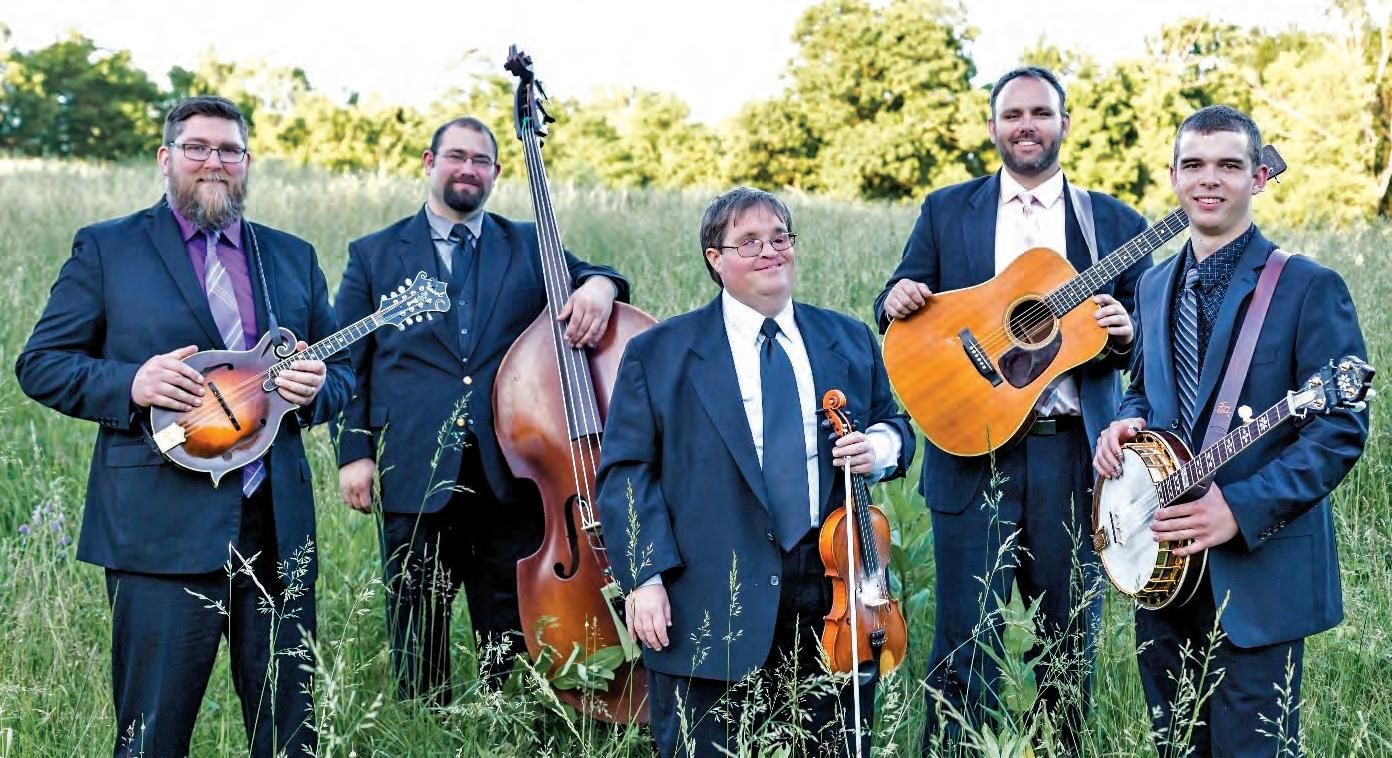





The event is free and open to the public. For more information, updates and a full schedule of events/live music, go to mountainheritageday.com.






The annual corn maze and pumpkin patch will return through Oct. 31 at Darnell Farms in Bryson City. Visit the farm for some old-fashioned fun. Walk through the corn maze ($12 admission), enjoy a hayride ($18 admission) and visit the huge six-acre pumpkin patch, where you and your family choose your perfect Jack O’ Lantern. Prices vary by size. There will also be food trucks, farm stand, apples and fall decor onsite. For more information, go to darnellfarms.com.



There will be a stage production of “Good Ol’ Girls” at 7:30 p.m. Sept. 22-23, 29-30, Oct. 5-7 and 2 p.m. Sept. 24, Oct. 1 and 8 on the Fangmeyer Stage at the Haywood Arts Regional Theatre in Waynesville.
The presentation is a heartwarming theatrical production that captures the essence of Southern women’s unyielding strength, friendship and resilience.
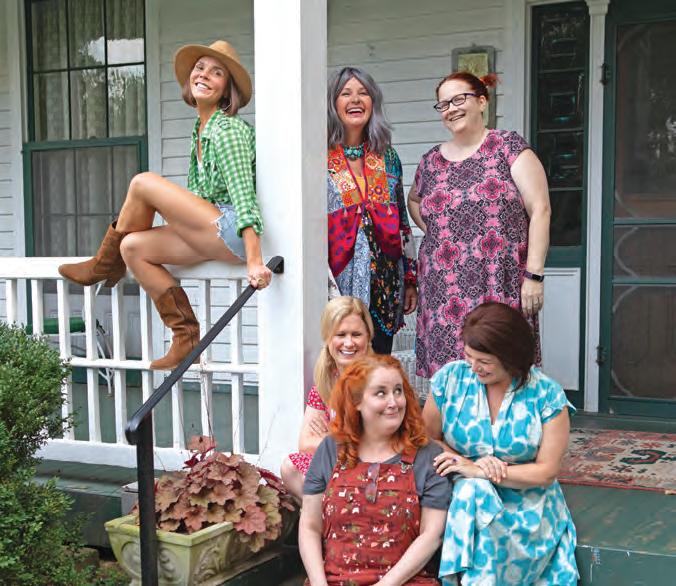

The show promises to be a delightful exploration of sisterhood, love, and the indomitable spirit of the American South. “Good Ol’ Girls” is a celebration of the bonds that tie Southern women together — unbreakable friendships formed through the highs and lows of life.
Set against the backdrop of a charming Southern community, the play weaves together the stories of strong-willed and diverse women who have weathered life’s storms with grace, humor, and courage.
From heartfelt ballads to foot-stomping bluegrass tunes, the show’s music and

• “Flights & Bites” will be held starting at 4 p.m. on Thursdays and Fridays at Bosu’s Wine Shop in downtown Waynesville. For more information on upcoming events, wine tastings and special dinners, go to waynesvillewine.com.
• “Take A Flight” with four new wines every Friday and Saturdays at the Bryson City Wine Market. Select from a gourmet selection of charcuterie to enjoy with your wines.
lyrics will transport audiences to a world where laughter, tears, and unforgettable memories unfold.
“Our goal with ‘Good Ol’ Girls’ is to create an unforgettable experience that honors the spirit of Southern women,” said Director Sheila Sumpter. “Through laughter, song, and heartfelt moments, we aim to showcase the unbreakable bonds formed among these characters and invite the audience to join us on an emotional journey filled with relatable and timeless themes.”
You will get a unique dinner theatre experience as HART offers dinner and dessert selections featuring Woof Street Food Truck and Hit the Pit BBQ on alternating nights. Wine is available by the glass or bottle and beer is available in pitchers as well.
To make reservations, call the HART Box Office at 828.456.6322 or go to harttheatre.org to make reservations online.
HART Box Office hours are noon to 5 p.m. Tuesday through Friday.
Educational classes and other events are also available. For more information, call 828.538.0420.


• “Uncorked: Wine & Rail Pairing Experience” will be held from 11 a.m. to 3 p.m. on select dates at the Great Smoky Mountains Railroad in Bryson City. Full service all-adult first class car. Wine pairings with a meal, and more. There will also be a special “Beer Train” on select dates. For more information and/or to register, call 800.872.4681 or go to gsmr.com.

The Haywood County Arts Council’s annual “Haywood County Studio Tour” will be held from 10 a.m. to 4 p.m. Saturday, Sept. 23, and from noon to 4 p.m. Sunday, Sept. 24.
The tour is a two-day, self-guided, free event in which Haywood County artists open their studios to the public.
HCAC will also host the “Art in the Park” gathering from 4-7 p.m. Thursday, Sept. 21, at the Sorrells Street Park in downtown Canton. The Haywood Ramblers will lead a community music jam from 4-5:30 p.m. with bluegrass outfit Nu-Blue performing thereafter. The event is free and open to the public.
For more information about the studio tour and a full list and map of participating artists, go to haywoodarts.org/studio-tour.
• “Spark of the Eagle Dancer: The Collecting Legacy of Lambert Wilson” will be showcased through Dec. 8 in the Fine Art Museum at Western Carolina University in Cullowhee. The exhibit features over 140 works of contemporary Native American art from the collection of one of Western North Carolina’s most notable art enthusiasts, the late Lambert Wilson. To learn more about the exhibition, please go to arts.wcu.edu/spark. The Fine Art Museum is open from 10 a.m. to 4 p.m. Tuesday through Friday and 10 a.m. to 7 p.m. Thursday.
• “What’s New?” exhibit will showcase new works by members of the Haywood County Arts Council through Nov. 13 at the HCAC in Waynesville. The presentation will focus on new techniques, materials and themes from local and regional artisans. Free and open to the public. haywoodarts.org.

• “Art After Dark” will take place from 6-9 p.m. Friday, Oct. 6, in downtown Waynesville. Each first Friday of the month (MayDecember), Main Street transforms into an evening of art, live music, finger foods, beverages and shopping as artisan studios and galleries keep their doors open later for residents and visitors alike. The event is free and open to the public. For more information, go to downtownwaynesville.com.
• Gallery Zella (Bryson City) will be hosting an array of artist receptions, exhibits and showcases. The gallery is open from noon to 5 p.m. Wednesday through Saturday. For more information, go to galleryzella.com or call 517.881.0959.

• Waynesville Photography Club meets at 7 p.m. every third Monday each month on the second floor of the Haywood Regional Health & Fitness Center in Clyde. The club is a nonprofit organization that exists for the enjoyment of photography and the improvement of one’s skills. They welcome photogra-

phers of all skill levels to share ideas and images at the monthly meetings. For more information, email waynesvillephotoclub@charter.net or follow them on Facebook: Waynesville Photography Club.
• Farmer’s Market (with artisans) will be held from 9 a.m. to 2 p.m. on Fridays and Saturdays through October at 117 Island St. in Bryson City. Stop by the old barn by the river for local, homegrown produce, as well as baked goods, jellies and preserves, authentic crafts and more. Food truck, picnic tables and live music. Leashed pets are welcome. Outdoor event. 828.488.7857.


• Haywood County Arts Council (Waynesville) will offer a wide range of classes, events and activities for artisans, locals and visitors. The HCAC gallery is open seven days a week from 10 a.m. to 5 p.m. and 11 a.m. to 4 p.m. Sundays. For more information and a full schedule, go to haywoodarts.org.
• Jackson County Green Energy Park (Dillsboro) will be offering a slew of classes, events and activities for artisans, locals and visitors. For more information and a full schedule, go to jcgep.org.


• Southwestern Community College Swain Arts Center (Bryson City) will host an array of workshops for adults and kids. For more information on the upcoming classes and/or to sign-up, go to southwesterncc.edu/scc-locations/swain-center.
• Dogwood Crafters in Dillsboro will offer a selection of upcoming art classes and workshops. For more information and a full schedule of activities, go to dogwoodcrafters.com/classes.html or call 828.586.2248.
Luxury, multi-generational dream home boasting 4 master bedrooms with private ensuites and second living quarters with separate kitchen, living area, bedroom, and laundry. Luxury RV pad with power, water, and septic on 600 ft of Tessentee Creek frontage. Vacation rentals allowed.



The best historical novels mesmerize readers. They cast their spell and whisk us out of the present and into the bygone days of the past. The writer creates a living, palpable world in which the reader is no longer sitting on a sofa in the den but is instead breathing the air of Renaissance Italy or Imperial China. The characters leap from the page, as alive to us as our neighbors, their manners and dress exotic and enticing, their ambitions, thoughts, triumphs and trials familiar and gripping.
In her “Kristen Lavransdatter” and “Master of Hestvigen” books, Nobel-prize winner Sigrid Undset performs this magic and we awake in medieval Norway. The novels of Kenneth Roberts transport us back to an America in the days of the French and Indian War and the American Revolution. Michael Shaara’s “The Killer Angels” takes us to early July of 1863 and the fields and woods of Gettysburg, where the generals play with dice and the stakes are life or death.
“By the Rivers of Babylon” (Ignatius Press, 2022, 391 pages) delves even deeper into time, resurrecting the cities of Jerusalem and Babylon of the 6th century B.C. Author Michael D. O’Brien centers his story on the developmental years of the Old Testament prophet Ezekiel, or Yezekiel. When we first encounter him, Yezekiel is shepherd boy living with his family in a village, practicing often with his sling to keep wild animals from the sheep and enjoying the days he spends outdoors. Later, in part through his family’s connections in Jerusalem, he goes to live and study in that city, and so becomes a worker in the Temple, preparing for the priesthood.

After some years, the city and its tiny kingdom fall prey to the empire of Babylon. These invaders seize Jerusalem, ransack the Temple, and then force many of the inhabitants, including Yezekiel, into servitude and march them off on a long journey to Babylon itself. Once there, they must build crude brick huts for themselves in a special enclave, and then go to work for the Babylonians. Eventually, they are permitted to grow gardens and engage in trade.
During this “Babylonian Captivity,” Yezekiel learns the art of making brick from clay and straw while constructing huts for
his fellow Jews. He lives humbly, assisting others whenever he can, and meets his future wife, Leah — she has disguised herself as a boy to avoid the sexual advances of her captors — when he builds a small house for her mother. With mixed success, he and some of his companions strive to keep their faith alive in the midst of many temptations and trials, founding a place of worship, praying and encouraging others to maintain the practices and beliefs of their religion.
O’Brien’s storytelling skills combined


O’Brien brings this same keen eye for detail in his presentation of Jewish history, religious customs and daily life. As when we read Sigrid Undset on the Middle Ages, we realize in particular the enormous part played by faith in the lives of these ancient people. From some of their eating habits to their daily prayers to religious festivals, the devout gave themselves to their religious beliefs and practices in a way few of us can imagine today. By so adeptly setting us among these people, O’Brien draws us into that life and makes it real. “By the Rivers of Babylon,” then, offers us the gift of all good historical fiction: It lures us into the mind and spirit of our ancestors.
Finally, “By the Rivers of Babylon” passes one more test that determines excellent historical fiction. It speaks to the present, giving readers inspiration, hope and guidance in their personal troubles and in the confusions of their era.
Near the end of the novel, Yezekiel must bury one of his good friends, murdered by two Babylonian soldiers for the minor offence of hunting. Over this crude grave, Yezekiel remembers his friend’s recent words, which we realize has served as one of the book’s themes: “Captivity is not a matter of exile in alien lands and kingdoms and empires. The only true sanctuary is in the heart of the soul.”
with his obvious knowledge and research into this era makes us a part of Yezekiel’s world. In his description of the forced march to Babylon, for instance, O’Brien recreates what the captives must have experienced as they plodded along the dusty roads. Here is a word picture from a short part of that march that is typical of the author’s style of writing and powers of imagination:


“Scattered everywhere are date palms swaying in the hot wind. Intermingled with the constant agriculture is extensive industry: the clanking of hammers on metal, tall furnaces belching fire, the thwacking of weaving looms in openfronted roadside shops, and hundreds of cookfires sending up columns of smoke beside houses
William C. Allsbrook Jr., will present his new book, “Making Music: The



Lights Bookstore in Sylva.
This idea brought to mind a line from Viktor Frankl’s “Man Search for Meaning”: “Everything can be taken from a man but one thing: the last of the human freedoms — to choose one’s attitude in any given set of circumstances, to choose one’s own way.”


Yezekiel in his Babylonian captivity and Frankl in a Nazi concentration camp both teach a similar lesson. Whatever tribulations come our way, we have within us an interior sanctuary where we can choose to be masters and protectors of the self.


(Jeff Minick reviews books and has written four of his own: two novels, “Amanda Bell” and “Dust On Their Wings,” and two works of nonfiction, “Learning As I Go” and “Movies Make the Man.” minick0301@gmail.com.)

The work is an intimate look at the role of the banjo in a long-standing, joyful musical tradition vital to the Appalachian region. It takes a close look at the instrument and banjo players in Haywood County.
To reserve copies of the book, call City Lights at 828.586.9499.



Citizens Bank and worked for Jackson County Schools Central Office.
As their children grew, showing animals in the fair became a family tradition. The Cochrans have been part of the livestock shows that took place at the fairgrounds since the mid-1980s, years before the Mountain State Fair got its start, and they’ve been going to the N.C. State Fair in Raleigh for 44 years. Buddy took their son, Scotty, for the first time when he was only 10 years old and haven’t missed a year since. Scotty, who would have been 54 this year, died in 2009, but Buddy and Janice still keep the tradition alive.
“It all ties together as far as our life is con-
Buddy and Janice Cochran are used to seeing things through.
The Waynesville residents have been married for 59 years, in that time instilling generations of children — including the two they raised — with a love for livestock. Last week, their decades of dedication earned them induction to the N.C. Mountain State Fair Livestock Hall of Fame.
“The Cochrans are generous with their time and resources, especially with youth that may not be able to participate in shows without their help,” said N.C. Agriculture Commissioner Steve Troxler. “Buddy and Janice are always willing to help any youth in the area in any way they need to get them
involved in livestock and showing.”
The induction was a surprise for the Cochrans, who had been attending the fair since its inception in 1994 without any such thing happening.
“There’s a lot of people that goes on that board with plaques just like ours that have … supported kids throughout the years and kept the Mountain State Fair going, and it’s just an honor to be able to be part of that,” Janice Cochran said.
For both Buddy and Janice, agriculture is a way of life that goes back to their respective childhoods in Haywood County. Throughout their life together, Janice said, Buddy has “always dealt in some kind of livestock.”
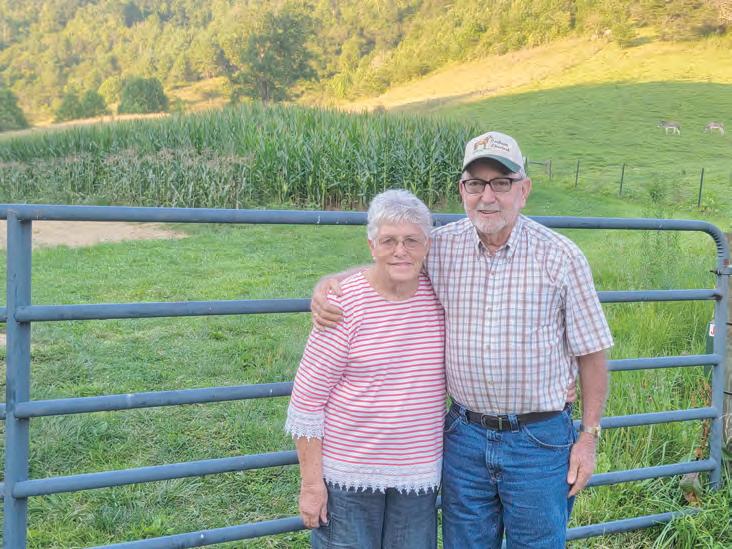
Since 2006, Buddy, a long-time horse and cattle trader, has worked as a market news reporter for the N.C. Department of Agriculture and Consumer Services, recording cattle prices at Asheville, the old Canton yard, the WNC Regional Livestock Center and North Wilkesboro, also filling in at Shelby and Turnersburg. Janice retired from First
cerned, because that’s what we dwell on and that’s what we go from year to year looking forward to — what we do and how the fair are going to turn out and how our cattle’s going to turn out, and all that responsibility,” Janice said. “We just love it. We’ve been involved for so long, that’s what we do as a family.”
Both Scotty and their daughter, Karen, grew up showing cattle and sheep, and the Cochrans’ granddaughter, Courtney Wade, showed cattle, sheep and hogs throughout her childhood. Wade now teaches agriculture at Pisgah High School and has kept her students involved with the fair since 2013.

The Cochrans’ dedication to passing on an agricultural legacy goes well beyond their biological family, however. They are both members of the Pisgah Future Farmers of America Alumni, and Buddy donates his time and trailer to transport all Pisgah FFA livestock to and from the fair. Since the dairy steer project began, the Cochrans have helped find buyers, market the steers and haul them after they are sold. Without her grandparents, Wade said, many of the livestock shows her students participate in wouldn’t be possible.
“They are true champions for agriculture, and that shows in their dedication to the Pisgah FFA program,” Wade said. “I have students who even years out of high school will drop by to visit them, just to sit on the porch and talk for a while. That is a testament to their impact on students, even when it may not be realized by the student when they are in school.”
It’s important work, they believe, a tangible contribution they can make to stem the tide of shuttered family farms and increasing numbers of kids who grow up not knowing where beef comes from before it’s stocked in the grocery store fridge.
“There's got to be somebody in the background that does all this stuff that provides the food we eat,” Janice said.
“There’s got to be somebody in the background that does all this stuff that provides the food we eat,” Janice said.
Undoubtedly, she said, the livestock experience they’ve gained through the fair has made a difference in the lives of the FFA kids in Wade’s class.
“Most of the kids in her program do not live on a farm and were not raised on the farm, so when she gets them signed up to show her cattle or her sheep or whatever, she has to actually train them,” Janice said.
But more than once, Janice said, one of those kids who came into the program knowing little to nothing

“The Cochrans are generous with their time and resources, especially with youth that may not be able to participate in shows without their help,”
— Steve Troxler, N.C. Agriculture Commissioner

Major renovations are proposed for the Bobby N. Setzer Fish Hatchery in the Pisgah National Forest near Brevard, and the U.S. Forest is seeking feedback on an environmental assessment analyzing their expected impacts.
The site was severely damaged during flooding from Tropical Storm Fred in 2021. Renovations will replace dated and failing infrastructure to ensure that the hatchery can continue to operate, while also increasing operational efficiency, maximizing fish production and making the water supply more reliable. The project will increase the capacity for fish production and include improved restroom facilities. Renovations are expected to improve the quality of water used at the hatchery and flowing downstream in the Davidson River.
Located on 44 acres of national forest land, the hatchery operates via a special use permit the Forest Service has granted to the N.C.
about livestock has since gone on to study agriculture in college, or even teach it as a career. She believes participating in the fair was key to opening up those possibilities.


Even for kids who don’t choose agriculture as a career, the fair is an important experience. Raising a sheep, goat or any other farm animal requires a high degree of responsibility. A lot of work goes into raising an animal and getting it ready for a show.
“You’ve got to take care of those animals,” Janice said. “Sometimes you have to feed them before you feed yourself.”
The Cochrans entered the Livestock Hall of Fame along with Leicester residents Tim and Sonia Worley, who, like the Cochrans, have been involved with the Mountain State Fair since it began. Responsible for introducing dozens of youth to raising and showing animals, they operate a cattle farm together and also grow corn and hay. Tim has spent more than a decade as a livestock health technician for the N.C. Department of Agriculture and Consumer Services, while Sonia is a tax preparer. Their son Tucker is a horticulture research specialist at the Mountain Research Station in Waynesville.
Tim’s father, Larry Worley, was inducted into the hall of fame in 2017.
Wildlife Resources Commission. It was built in the late 1950s by the U.S. Fish and Wildlife Service and turned over to the Wildlife Commission in 1983, with a major renovation in the mid-1990s. Currently, the hatchery produces and stocks more than 600,000 catchable trout each year in 13 Western North Carolina counties.
Trout fishing in North Carolina has an economic impact of $1.38 billion, said Wildlife Commission Executive Director Cameron Ingram, and is enjoyed by more than 300,000 state residents — plus many more visitors from out of state.
“Most trout stocked in our public waters originate from this hatchery,” Ingram said. “Renovating Setzer Hatchery will ensure a robust trout fishing experience remains a reality in North Carolina, and secure continued economic opportunities, especially to our mountain communities.”
The Environmental Assessment is open for public comment through Tuesday, Oct. 17. To view the document or submit comments, visit fs.usda.gov/project/nfsnc/?project=59657




Following a three-year absence, the Mountain Life Festival will return 10 a.m. to 4 p.m. Saturday, Sept. 23, at the Mountain Farm Museum in the Great Smoky Mountains National Park. The event preserves the legacy of the diverse Appalachian customs practiced for generations by the many families who lived on lands that became Great Smoky Mountains National Park.
The day’s activities reflect the spirit of cooperation that existed among families and neighbors, especially during the har-
vest. Learn what life was like by interacting with living historians and cultural demonstrators. Share in traditional autumnal pursuits that were an important part of rural life in the mountains, such as blacksmithing, sorghum milling, apple cider pressing, soap making and live music.
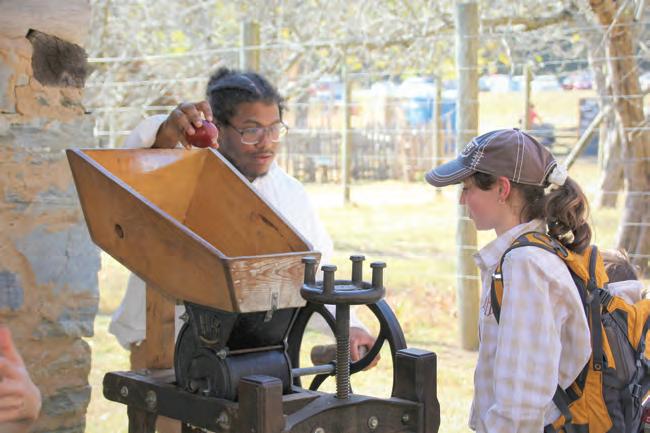
Located next to the Oconaluftee Visitor Center 2 miles north of Cherokee, the festival is free to attend and no parking fee is required. Sept. 23 is a fee-free day across the National Park Service in celebration of National Public Lands Day. The last feefree day of 2023 is Veterans Day, on Saturday, Nov. 11. Park rangers will continue enforcement for illegally or dangerously parked vehicles on fee-free days.
The N.C. Mountain State Fair Livestock Hall of Fame was created by livestock show staff to recognize individual contributions to the livestock industry and livestock shows in Western North Carolina. Each year, it welcomes new inductees representing the agricultural tradition across the mountain region. This is the first time since 2019, when Haywood County resident Jim Padgett was inducted, that an inductee has hailed from a county west of Buncombe.

THURSDAY Horse Show, Bingo Night, Pork Chop Revue, Special Persons Sheep Show
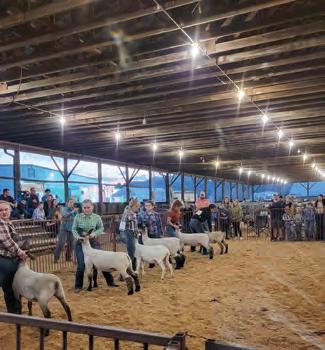
FRIDAY Live Action Rodeo, Riding on Faith, Livestock Costume Contest, Ag & Heritage Demos


SATURDAY Tractor Pull, Baking Contest, Cornhole Tournament, Natural Beauty Contest, Haywood Idol, Bluegrass & Clogging
SUNDAY Dairy Cow Show, Truck Pull, Ag & Heritage Demos, Community Gospel Celebration
THURSDAY 5PM-10P
FRIDAY 5PM-10PM
SATURDAY 9AM-10PM
SUNDAY 11AM-6PM

Adults $8 per day
Ages 6-12 $6 per day
Kids under 5 FREE TICKETS SOLD AT THE GATE — CASH ONLY
Midway rides not included in gate admission

Monarch Butterfly Day will be filled with fun, informative activities for both kids and adults 10 a.m. to 3 p.m. Saturday, Sept. 30, at the N.C. Arboretum in Asheville, coinciding with a fall plant sale that will also run during those same hours Friday, Sept. 29. Monarch Butterfly Day will include a guided trail walk 10 a.m. to noon, kids science and art activities, and a free adult education program, “Migrating Monarchs,” with Blue Ridge Naturalist Instructor Dan Lazar, who will map the monarch’s migration and its compelling story, followed by a monarch tagging and release demonstration. The one-hour program will be held at 11 a.m. Sept. 29 and 30.
Additionally, the day will mark the opening of the Monarchs and Milkweed Exhibit in the Baker Exhibit Center. This immersive, multimedia experience running through January 7 examines the relationship between these two species and how they have developed to depend on one another.

Meanwhile, the Fall Plant Sale and Market will give visitors the chance to explore unique plants grown by dozens of local farmers — and from the Arboretum’s greenhouses — while also enjoying live music and food.
The plant sale, as well as all Monarch Butterfly Day activities, classes and talks, are included with an Arboretum parking pass, with no pre-registration required. North Carolina Arboretum Society Members get in free. For more information, visit ncarboretum.org.
The Haywood County Fair will take over the Smoky Mountain Event Center — formerly known as the Haywood County Fairgrounds — Thursday, Sept. 28, through Sunday, Oct. 1.

The schedule features a petting zoo, rodeo, horse show, tractor pull, livestock show, carnival and more. There’s still time to enter the bevy of contests covering everything from food to photos — exhibit intake day will be held 10 a.m. to 6 p.m. Tuesday, Sept. 26.
Daily admission is $8 for adults and $6 for kids 6-12, with kids under five entering free. Admission does not include rides, and tickets sold at the gate are cash only. Fair hours are 5-10 p.m. Sept. 28-29, 9 a.m. to 10 p.m. Sept. 30 and 11 a.m. to 6 p.m. Oct. 1. For a full schedule, or for information about entering the fair, visit haywoodcountyfair.com.
Haywood County native Kyle Miller has moved into the top leadership position at the Mountain Research Station in Waynesville, after his predecessor Will Morrow retired following more than 30 years with the N.C. Department of Agriculture and Consumer Services.
“I’ve always loved agriculture. I’ve always just wanted to farm my whole life,” Miller said. “When it’s in your blood, it’s more than just a job or profession. You feel like you’ve got a moral responsibility, and you owe it to the rest of society.”
As the station superintendent, Miller now has an opportunity to lead the station in the many ways it contributes to society as home to a variety of research projects. Projects help farmers glean better yields and profits but also benefit consumers, as higher yields better meet the needs of a growing
Help “rewild” Fontana Lake campsites during a volunteer workday 9 a.m. to 5 p.m. Saturday, Sept. 23, at Tsali Boat Ramp.
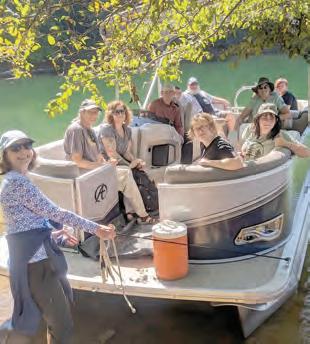
“Returning Campsites to the Wild” is an environmental rehabilitation project that addresses the problem of trashed campsites and teaches participants the importance of caring for the outdoors. Participants will clean the trash and waste left behind at informal campsites along the shores of Fontana Lake while learning about the principles of Leave No Trace.
Food and supplies will be provided, but volunteers should bring a hat, water bottle, swimsuit and towel. Organized by the Environmental Action Community of WNC through a grant from the Tennessee Valley Authority. RSVP to info@eacwnc.org
populations.

“Kyle will be a great superintendent because of his experience and his love of agriculture. That experience includes working at the Mountain Research Station part time in high school and college and later becoming a fulltime employee in 2011,” said Agriculture Commissioner Steve Troxler. “Our research stations serve as platforms for projects aimed at keeping North Carolina agriculture as productive and profitable as possible, and I know Kyle is more than capable of leading that work.”
Miller, who grew up in the Canton area and graduated from Pisgah High School, earned a bachelor’s degree in agricultural extension and education from N.C. State University in 2006. After working in construction and teaching high school agriculture, he began working full-time at the Mountain Research Station as a research specialist. In 2017, he moved to the livestock and forage manager position where he remained until his promotion this summer. He and his wife Maria have twin 9-year-old boys named Jack and Walker.

Western Carolina University’s resident fall color expert is predicting that the start of leaf season will come earlier than usual but that peak will lack the intensity it had last year, primarily because leaves won’t be changing color at the same time.
“It pains me to say this, but I think that last year was an anomaly in our colors, which were so bright, because we had perfect conditions,” said Professor Emeritus Beverly Collins. “The way the weather is going, and I can’t predict with certainty because I can’t predict when that cold snap is going to happen, but I think that the colors will not be as bright this year as last year because they won’t be as synchronous.”
Because the weather has been dry, some leaves might turn earlier, as dryness brings on the end-of-season stress that spurs the color change. Collins said leaf lookers will have from the end of September through early November to see this year’s color change.
“The second factor is how cold it gets at night,” she said. “The thing that brings on color really quickly is having it get cold and down into the lower 40s with bright, sunny days.”




Day length is the main factor in leaf change, however. Collins said that the earlier nights cause chlorophyll production to slow down, then to stop, until eventually all the chlorophyll are destroyed.

Leaves will change first at the higher elevations, where the temperatures are lower, and along streams and roads with early-changing species like walnuts, blackgum and dogwood. From there, the leaves turn down the mountains. By the last week of October color will hit town in Sylva and last until November further south.
Track fall foliage at smokymountains.com/fall-foliage-map/ where a map shows when colors are expected to peak in North Carolina.


A $100,000 grant from the Transylvania County Tourism Development Authority has put a $2 million project to build a red spruce nursery past the halfway mark of its fundraising goal.
The Southern Highlands Reserve, located in Lake Toxaway, has grown thousands of red spruce trees for planting on public lands across the region, and now it needs a larger, more efficient nursery facility to raise the 50,000 additional trees the U.S. Forest Service has requested. The Transylvania TDA’s grant combines with $300,000 from the National Forest Foundation and several contributions from private donors and family foundations to total more than $1 million raised to date. The new greenhouse will replace a pair of 20-yearold hoop houses, featuring improved energy efficiency and more than doubling current capacity within the same footprint, while offering enhanced opportunities for visitor education and a home to the dozens of other native plant species the Reserve propagates for restoration projects as well as home gardens.
The Reserve plans to break ground on the project this fall and to hold a grand opening in summer 2024.
“We are honored and grateful to work with this incredible team of people to streamline restoration work and preserve our natural resources for the generations to come,” said Executive Director Kelly Holdbrooks. “By working together the way trees and plants do, we can save rare and threatened plants and animals.”
The red spruce, the largest conifer indigenous to the Southern Appalachians, is central to the region’s ecosystem. More than a century of logging, fire, pollutants and parasites has taken its toll on the red spruce population, which forms part of the spruce-fir ecosystem housing two federally endangered species, the Carolina northern flying squirrel and the spruce-fir moss spider, among other rare species. As warming temperatures push more species northward and to higher elevations, these forests will be an important refuge.
The Reserve is a founding member of the Southern Appalachian Spruce Restoration Initiative, a group of organizations, agencies and institutions working to preserve, protect and restore the spruce-fir ecosystem.
“Our restoration efforts for red spruce rely heavily on our partnership with SHR and their ability to produce genetically sound stock,” said Lorie Stroup, biologist with the U.S. Forest Service. “Increasing their capacity with a new greenhouse will greatly increase our ability to restore this ecosystem that desperately needs our help.”

MONDAY-FRIDAY7:30-5:00•WAYNESVILLEPLAZA
WNC Shuttle is a proud 110% member of the Haywood County Chamber of Commerce!



As a small business owner, the Chamber has helped me integrate tightly into the local business community through programs such as Leadership Haywood, ChamberConnects, and Issues and Eggs, among many others.

I’m grateful to the Haywood Chamber for providing an ongoing series of high quality networking and educational opportunities to further my personal and professional growth. Thank you, Haywood Chamber of Commerce, for your commitment to helping businesses like mine thrive and better serve the visitors and the residents of our wonderful County!”
 BY ADAM BIGELOW
BY ADAM BIGELOW
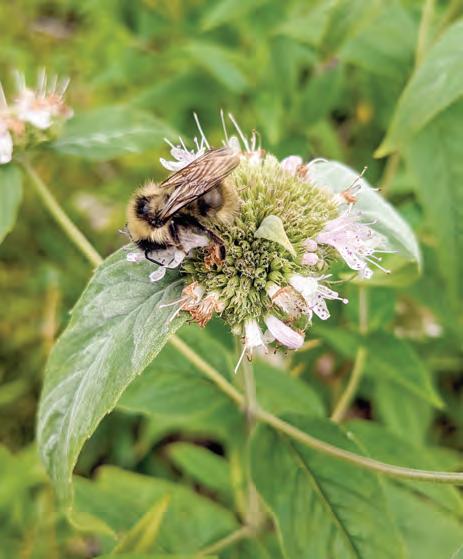
No matter where you are in the world, if you encounter a plant that has a square stem and opposite leaf arrangement — when two leaves grow out of the stem at the same place, but on opposing sides — it is most likely a member of the mint family (Lamiaceae).
Most all members of the mint family are edible, and most are also fragrant. But not all of them. Nature just doesn’t seem to want to behave according to the rules that we place on her. And do be careful because our minds like to play tricks on us. So, remember that there is no such thing as almost square, or kind of square. Square means four equal sides. Kind of square is actually a triangle or rectangle, hexagon or trapezoid. Don’t be fooled.


Among the many members of the mint family that grow around us and are native here in Southern Appalachia — including self-heal (Prunella vulgaris), bee balms (Monarda spp.), bugleweeds (Lycopus spp.), horsebalms (Collinsonia spp.), obedient plant (Physostegia spp.) and so many more — I have a real affinity for the members of the genus Pycnanthemum. These are the mountain-mints.
There are 14 different species of Pycnanthemum that are native to North Carolina, and all but one can be found in the mountains. Though they are all similar in growth and habit, their differences set them apart as easily as their names do. Beadle’s, basil, stone, savannah, hoary, Loomis’, thinleaf, clustered, southern, awned, slender, Torrey’s, whorled and Virginia are all of the different species, when you add “mountain-mint” to these names. Only the awned mountainmint (Pycnanthemum setosum) is not found growing in the mountains. And, since it grows only along the coastal plain, is it even really a mountain-mint? Coastal-mint, maybe?
In addition to their opposite leaves and square stems, mountain-mints also share a dense cluster of small flowers held up by leaves that tend to develop a frosty white sheen. This helps keep browsing animals from eating the leaves and attract insects to fly or crawl to the flowers to drink the nectar, providing pollination that leads to seed development.
When it comes to attracting beneficial insects, there may not be a better choice than clustered mountain-mint (Pycnanthemum muticum). Blooming from early summer through frost, the multiple small flowers of clustered mountain-mint are covered in a diversity of insects not seen on most plants, especially all at the same time. I have spent way too much time watching the mountain mint and all of the insects on it — large black and blue iridescent wasps, tiny green and gold metallic bees, bumblebees, ants, beetles, moths, butterflies, fireflies and more all nectaring on the flowers at the same time. They are no more bothered by each other’s presence than they are by mine, ogling them, taking pictures and videos and even bravely petting their backs and getting “high fives” from the bumbles. If you add one native plant to your garden this year, let it be clustered mountain-mint.
Insects aren’t the only creatures that like to drink from mountain-mint. I often spot this plant at the beginning of a hike, near the trailhead, and I pick some of the leaves to put in my drinking water. By the time I’m thirsty, I have a nice, cool, refreshing drink of mint water. I also enjoy taking some of the leaves and crushing them up with sugar or honey and adding it to a clear liquor. You can use vodka or rum, but I prefer to use my favorite whiskey, which just happens to be clear and untaxed, to make mountain mint mojitos! Cheers!
(Adam Bigelow lives in Cullowhee and leads weekly wildflower walks most Fridays and offers consultations and private group tours through Bigelow’s Botanical Excursions. bigelownc@gmail.com.)

• The Jackson County Farmers Market meets every Saturday November through March 10 a.m. to 1 p.m. and April through October 9 a.m. to noon at Bridge Park in Sylva, 110 Railroad St. Special events listed on Facebook and Instagram.
• The Jackson Arts Market takes place from 1-5 p.m. every Saturday at 533 West Main St. in Sylva with live music and an array of local artists.
• Matt’s Ministry is partnering with Brasstown Community Center to create a Community Food Pantry 1-3 p.m. Sept. 21. No sign-up or income requirement, just drive up to the new outdoor pavilion, volunteers will hand out bags of food.
• The Black Generational Wealth Committee of Haywood County will hold a resource fair 2-5 p.m. Saturday, Sept. 23, at the Pigeon Community Multicultural Center in Waynesville. There will be food, door prizes and expert information on investments, acquiring a home, building credit and wills and estate planning.
• Jackson County NAACP will host a Salad Supper Fundraiser “Salvaging the Beloved Community from the Nightmare of the Lost Cause” from 5:30-7:30 p.m. Saturday, Sept. 30. There will be a silent auction and guest speaker Dr. Myron Jackson. All funds will benefit the Leroy Jackson Memorial Scholarship. For more information or to register visit jacksonncnaacp.org/events or contact jcnaacp54ab@gmail.com.
• REACH of Haywood County invites the public to a free event, Creating a Trauma Informed Community Response to Domestic Violence, to be held 9 a.m. to 4:30 p.m. Oct. 5, at Charles M. Beall Auditorium in Clyde, with onsite registration 8-8:40 a.m. Visit reachofhaywood.org or call 828.456.7898 for more information.
• Sarge’s 18th Annual Downtown Dog Walk will take place at 10 a.m. Saturday, Sept. 23, in Waynesville. Preregistration for walkers and their dogs will take place 12-6 p.m. Sept. 21, at Sarge’s Animal Rescue Foundation. On-site registration will take place at the courthouse before the parade kickoff. Registration is $25 for adults, $!5 for children. For more information visit sarges.org.
• Mountain Area pregnancy Services and the WIC Breastfeeding Peer Counselor work together to provide a casual support group for prenatal and breastfeeding individuals from 1-2 p.m. on Tuesdays at Mountain Area Pregnancy Services, 177 N Main St. Waynesville, NC. All are welcome, registration is recommended. For more information, please call 828.558.4550.
• Chess 101 takes place 3:30-4:30 p.m. every Friday at the Canton Branch of the Haywood County Library. For more information, email Ashlyn Godleski at ashlyn.godleski@haywoodcountync.gov or call 828.356.2567.
• Knit Night takes place at 5:30-7:30 p.m. every second Tuesday of the month at The Stecoah Valley Center. The event is free and open to the public. RSVP is recommended: 828.479.3364 or amber@stecoahvalleycenter.com.
n All phone numbers area code 828 unless otherwise noted.
n To have your item listed email to calendar@smokymountainnews.com
• Sylva Writers Group meets Wednesday mornings at City Lights Books. If interested contact sylvawriters@gmail.com.
• A Novel Escape Book Club takes place at 6:30 p.m. on the first Tuesday of every month at the Novel Escape Bookstore (60 E Main St, Franklin). Every other month one book is selected for discussion. On alternate months the meeting is round-table discussion in which participants share what they’ve read lately. For more information call the bookstore at 828.369.9059 or visit anovelescapefranklin.wordpress.com.
• Thomas Rain Crowe will read from his new book of poetry “Painting from the Palette of Love: The Mystical Poetry of Kabir” during an event 1-3 p.m. Saturday, Sept. 30, at Blue Ridge Books in Waynesville. For more information visit blueridgebooksnc.com or call 828.456.6000.
• Ron Rash will speak on his new book “The Caretaker” during an event at 7 p.m. Tuesday, Oct. 10, in the Fangmeyer at Hart theater in Waynesville. Hosted by Blue Ridge Books, tickets are $10. Profits will be donated to the Pigeon Center.
• The Arts Council of Macon County and the Macon County Library are partnering to offer Cherokee Dance with Bill Dyar at 3:30 p.m. Thursday, Nov. 9, at the Macon County Library. For more information call 828.524.3600 or visit fontanalib.org.
• Next Chapter Book Club Haywood is a fun, energetic and highly interactive book club, ideal for individuals with intellectual and developmental disabilities. The group meets every second and fourth Monday of the month. For more information, email Jennifer at jennifer.stuart@haywoodcountync.gov or call 828.356.2561.
• Storytime takes place at 10 a.m. every Tuesday at the Macon County Library. For more information visit fontanalib.org or call 828.524.3600.
• Culture Talk takes place at 2 p.m. on the first Wednesday of every month at the Macon County Public Library. Travel the world from inside your library. This event features guest speakers and food sampling from the location being discussed. For more information visit fontanalib.org or call 828.524.3600.
• A car show will be hosted at 10 a.m. Sept. 23, at East Sylva Baptist Church. All makes and models are welcome. Contact the church office by phone at 828.586.2853 to enter a car. Spectator admission is free.
• Hobbit Day Celebration will take place 10 a.m. to 5 p.m. Saturday, Sept. 23, at A Novel Escape Bookstore (60 E Main St, Franklin). A full day of fun, games, food and merriment for all ages.
• The Mountain Life Festival returns to the Smokies 10 a.m. to 4 p.m. Saturday, Sept. 23, at the Mountain Farm
Museum in the Great Smoky Mountains National Park. Located next to the Oconaluftee Visitor Center two miles north of Cherokee, the festival is free to attend, and no parking fee is required.
• The Haywood County Fair will take place Thursday, Sept. 28 through Sunday, Oct. 1. Daily admission is $8 for adults and $6 for kids 6-12, with kids under five entering free. For a full schedule, or for information about entering the fair, visit haywoodcountyfair.com.
• Plott-tober Fest will run Oct. 5-8 and will feature Plott hound trials and a UKC Bench Show as well as German cultural events, children’s activities, traditional German cuisine and musical entertainment. The festival will be held at Canton’s Sorrells Park with additional events scheduled at the Museum of Haywood County History at the Shook-Smathers House in Clyde as well as Morning Star United Methodist Church in the Dutch Cove community of South Canton. For more information or admission visit nchchgs.org.
• “ColorFest,” Dillsboro’s 15th annual Fine Arts & Crafts Fair will hit the streets 10 a.m. to 4 p.m. Saturday, Oct. 7, in historic Dillsboro. There will be local artisans and vendors, clogging, live music, food and more. For more information call Brenda Anders at Dogwood Crafters at 828.506.8331.
• Trivia Night is hosted 6:30-8:30 p.m. every Thursday evening at the Meadowlark Motel in Maggie Valley. For more information visit meadowlarkmotel.com.
• Smoky Mountain Event Center presents Bingo Night with doors opening at 4:30 p.m. and games starting at 6 p.m. on the second Tuesday and fourth Monday of the month. For more information visit smokymountaineventcenter.com.
• “Flights & Bites” will be held starting at 4 p.m. on Thursdays and Fridays at Bosu’s Wine Shop in downtown Waynesville. For more information on upcoming events, wine tastings and special dinners, click on waynesvillewine.com.
• Take a trip around the world with four different wines every Friday 11 a.m. to 8 p.m. and Saturday 11 a.m. to 6 p.m. at the Bryson City Wine Market. Pick from artisan Charcuterie Foods to enjoy with wines. 828.538.0420
• Cooking classes take place at the McKinley Edwards Inn from 6-8:30 p.m. on Thursday nights. To reserve your spot call 828.488.9626.
• Chess 101 takes place from 3:30-4:30 p.m. every Friday in the Canton Branch of the Haywood County Public Library. No registration required, for more information call 828.648.2924.
• Wired Wednesday, one-on-one technology help is available at 3-5 p.m. every Wednesday at the Canton Branch of the Haywood County Library. For more information or to register, call 828.648.2924.
• Uptown Gallery, 30 East Main St. Franklin, will be offering Children’s Art Classes Wednesdays afternoons. Adult workshops in watercolor, acrylic paint pouring, encaustic and glass fusing are also offered. Free painting is available 10 a.m. to 3 p.m. every Monday in the classroom. A membership meeting takes place on the second Sunday of the month at 3 p.m. All are welcome. Call 828.349.4607 for more information.
• “Thursday Painters” group will be held from 10 a.m. to 3 p.m. on Thursdays at The Uptown Gallery in
Visit www.smokymountainnews.com
n Complete listings of local music scene
n Regional festivals
n Art gallery events and openings
n Complete listings of recreational offerings at health and fitness centers
n Civic and social club gatherings
Franklin. Free and open to the public. All skill levels and mediums are welcome. Participants are responsible for their own project and a bag lunch. 828.349.4607 or pm14034@yahoo.com.
• A weekend of riverside games, whitewater rafting, adventure films and gear deals will liven up the fall Friday, Sept. 22, through Sunday, Sept. 24, at Nantahala Outdoor Center in Swain County. Free, with a full schedule of events online at www.noc.com/events/gaf .
• Take a 4.6-mile hike to a spectacular view along the Bartram Trail near Highlands 10 a.m. to 3 p.m. Saturday, Sept. 23. The trail is rated moderate, with 940 feet of elevation change. Leashed dogs are welcome. Organized by MountainTrue and free with registration at mountaintrue.org/event.
• There will be a volunteer workday to help rewild Fontana Lake campsites 9 a.m. to 5p.m. Saturday, Sept. 23, at Tsali Boat Ramp. Participants will clean the trash and waste left behind at informal campsites along the shores of Fontana Lake while learning about the principles of Leave No Trace. Food and supplies will be provided, but volunteers should bring a hat, water bottle, swimsuit and towel. RSVP to info@eacwnc.org.
• Join in for the sixth annual Pollinator Field Day 10 a.m. to 1 p.m. Saturday, Sept. 23, at the Mountain Horticultural Crops Research and Extension Center in Mills River. Free, with participants given light refreshments and a free native plant to take home. Learn more or register at eventbrite.com/e/ncpca-pollinator-fieldday-tickets-707575877497.
• The annual Mountain Monarch Festival will take place 11 a.m. to 3 p.m. Saturday, Sept. 23, at Gorges State Park in Sapphire. The event celebrates the monarch butterfly during its migration and bring attention to the species declining numbers. The event is free and open to the public. Registration is suggested. For event details, visit friendofgorges.org.
• The 16th annual Power of Pink 5K Run/Walk/Dog Walk will raise money for early breast cancer detection on Saturday, Sept. 23, at Frog Level in Waynesville. Registration fee is $35 for adults $15 for youth 17 and under, $25 for a 5K team and $30 for virtual participation. Hosted by Glory Hound Events. Sign up at www.gloryhoundevents.com/event/power-of-pink-5k.
• Camp with the pigs at Misfit Mountain Animal Rescue during a Community Festival 5-8 p.m. (and overnight) Saturday, Sept. 23, at the rescue center in Clyde, at 922 Incinerator Road. There will be live music, food trucks, live art demonstrations and pop-up vendors. For tickets visit misfitmountainnc.org.
• Haywood County Master Gardener Volunteers will be at the Haywood County Fair from noon to 6 p.m. Saturday, Sept. 30 and Sunday, Oct. 1. There will be information available about a wide variety of gardening topics and gardeners will be ready to answer questions.
The Smoky Mountain News Marketplace has a distribution of 16,000 copies across 500 locations in Haywood, Jackson, Macon and Swain counties, including the Qualla Boundary and west Buncombe County. Visit www.wncmarketplace.com to place your ad!
Rates:
• $15 — Classified ads that are 25 words, 25¢ per word after.
• Free — Lost or found pet ads.
• $6 — Residential yard sale ads.*
• $1 — Yard Sale Rain Insurance
Yard sale rained out? Call us by 10a.m. Monday for your ad to run again FREE
• $375 — Statewide classifieds run in 170 participating newspapers with 1.1+ million circulation. (Limit 25 words or less)
• Boost Online — Have your ad featured at top of category online $4
• Boost in Print
• Add Photo $6
• Bold ad $2
• Yellow, Green, Pink or Blue Highlight $4
• Border $4
Note: Highlighted ads automatically generate a border so if you’re placing an ad online and select a highlight color, the “add border” feature will not be available on the screen.
Note: Yard sale ads require an address. This location will be displayed on a map on www.wncmarketplace.com

p: 828.452.4251 · f:828.452.3585 classads@smokymountainnews.com www.wncmarketplace.com

NOTICE OF ADMINISTRATION
Case No.2023 E 000575 Rachel N Ray, having
Billy Ray Gevedon Dec 13 2023
Sue Queen Hall Dec 13 2023
Administrator 11 Meadow Dr Horse Shoe, NC 28742
NOTICE OF ADMINISTRATION
Case No.2023 E 000497
Katherine Ann Kelley Dec 13 2023
authorized by the Laws
assets belonging to the estate.
192 Pickle Springs Rd
REQUEST FOR PROPOSAL
Administrator 590 Auburn Rd Waynesville, NC 28786
NOTICE OF ADMINISTRATION
Case No.2023E 000555
MECHANICS, BODY AND PAINT TECHS!
HOUND MIX, BROWN/ BLACK/WHITE — JUDITH 6 yr-old girl; hikes and car rides, and playing with other dogs. Asheville Humane Society (828) 761-2001 adoptions@ ashevillehumane.org
“WORKING CATS”
Better Homes and Gardens Real Estate - Heritage
• Carolyn Lauter - carolyn@bhgheritage.com
Allen Tate/Beverly-Hanks Realtors - beverly-hanks.com

• Billie Green - bgreen@allentate.com

• Brian K. Noland - bknoland@allentate.com
• Anne Page - apage@allentate.com
• Jerry Powell - jpowell@allentate.com
• Catherine Proben - cproben@allentate.com
• Ellen Sither - esither@allentate.com

MANUFACTURING DAY
Asheville Humane Society has cats available who are -
house, etc. Fully vaccinated and spayed/ neutered. (828) 761-2001 adoptions@ ashevillehumane.org
HELP WANTED-AMICI’S ITALIAN RESTAURANT
ATTENTION OXYGEN THERAPY USERS!
PUBLISHER’S NOTICE Rentals

TIMESHARE CANCELLATION EXPERTS.
DENTAL INSURANCE
• Karen Hollingsed- khollingsed@allentate.com
• John Keith - jkeith@allentate.com
• Randall Rogers - rrogers@allentate.com
• Susan Hooper - shooper@allentate.com

• Hunter Wyman - hwyman@allentate.com
•Julie Lapkoff - julie.lapkoff@allentate.com
•Darrin Graves - darrin.graves@allentate.com
ERA Sunburst Realty - sunburstrealty.com
•Rick Border - sunburstrealty.com


• Randy Flanigan - 706-207-9436
Keller Williams Realty - kellerwilliamswaynesville.com

•The Morris Team - www.themorristeamnc.com
• Ron Breese - ronbreese.com
• Landen Stevenson- landen@landenkstevenson.com
Lakeshore Realty
• Phyllis Robinson - lakeshore@lakejunaluska.com
Mountain Dreams Realty- maggievalleyhomesales.com
• Lyndia Massey- buyfromlyndia@yahoo.com
Mountain Creek Real Estate

• Ron Rosendahl - 828-593-8700
McGovern Real Estate & Property Management


• Bruce McGovern - shamrock13.com
RE/MAX Executive - remax-waynesvillenc.com remax-maggievalleync.com
• The Real Team - TheRealTeamNC.com
• Dan Womack - womackdan@aol.com
•Mary Hansen - mwhansen@charter.net
• Billy Case- billyncase@gmail.com
Rob Roland Realty
• Rob Roland - 828-400-1923


Smoky Mountain Retreat Realty

• Tom Johnson - tomsj7@gmail.com
• Sherell Johnson - Sherellwj@aol.com
13 "Saturday Night Fever" star
14 Hard Italian cheese
15 "Sure, put me down"
16 Toenail
ANSWERS ON PAGE 34
Here’s How It Works: Sudoku puzzles are formatted as a 9x9 grid, broken down into nine 3x3 boxes. To solve a sudoku, the numbers 1 through 9 must fill each row, column and box. Each number can appear only once in each row, column and box. You can figure out the order in which the numbers will appear by using the numeric clues already provided in the boxes. The more numbers you name, the easier it gets to solve the puzzle!

DON’T



